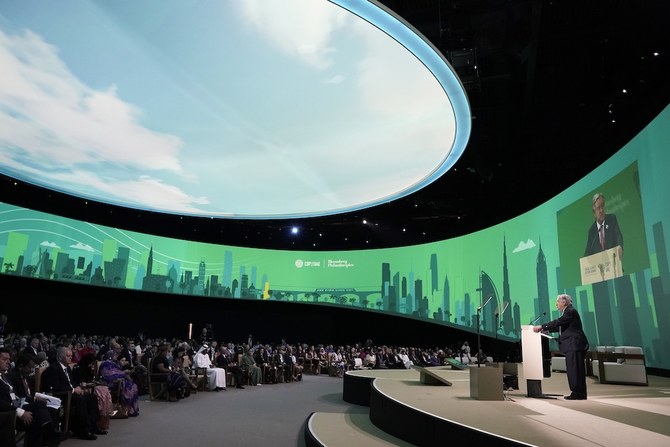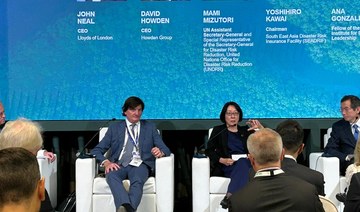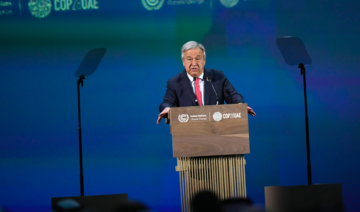DUBAI: Leaders of developing nations jumped into Saturday’s second day of a UN climate summit to press rich industrial countries to share their know-how to fight global warming and ease the financial burdens they face — while trumpeting their own natural resources that swallow heat-trapping carbon in the air.
The annual United Nations Conference of the Parties, known as COP28, in the UAE featured about 150 presidents, prime ministers, royals and other leaders who are presenting their plans to cut heat-trapping emissions and mostly seek unity with other nations to avert climate catastrophe that seemed to draw closer than ever in 2023.
READ MORE: Click here for our coverage of COP28
---
FASTFACT
116
The number of countries that have signed up to a commitment to triple the world's renewable energy capacity by 2030.
1151 GMT
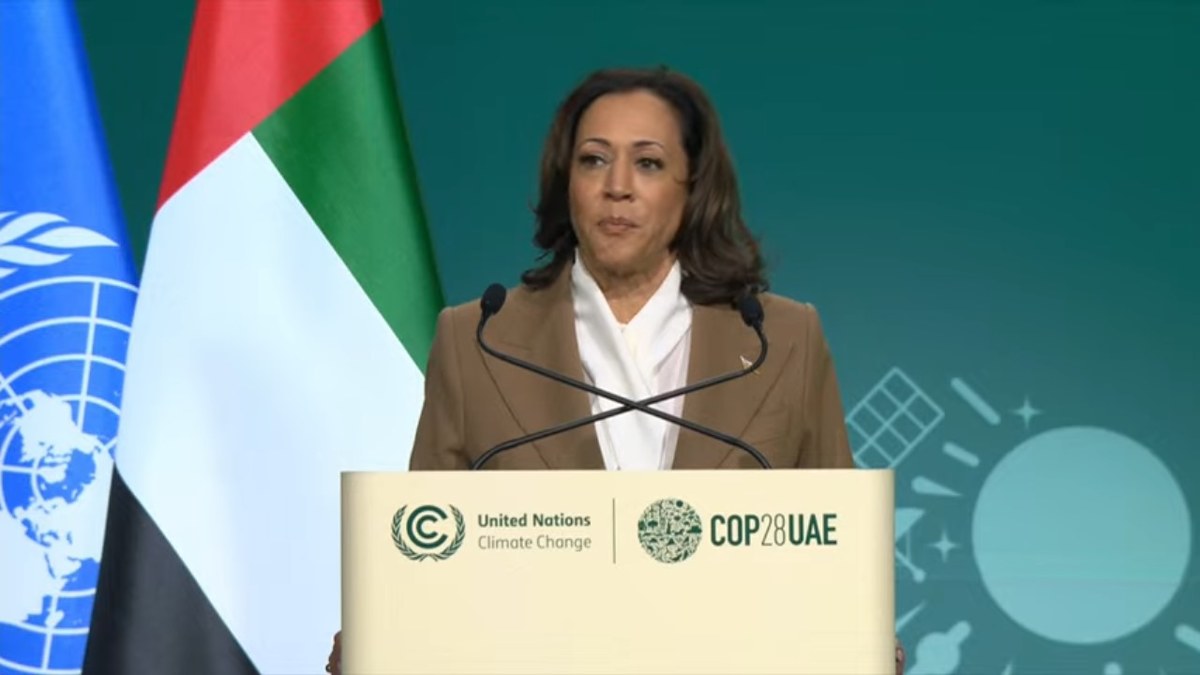
Kamala Harris, Vice President of the United States.
“Today, I am proud to announce a new $3 billion pledge to the green climate fund, which helps developing countries invest in resilience, clean energy, and nature-based solutions,” Kamala Harris, Vice President of the United States, said in her speech.
“Today we are demonstrating in action how the world can and must meet this crisis.”
“This is a pivotal moment, our action collectively, or worse our inaction, will impact millions of people for decades to come.”
1132 GMT
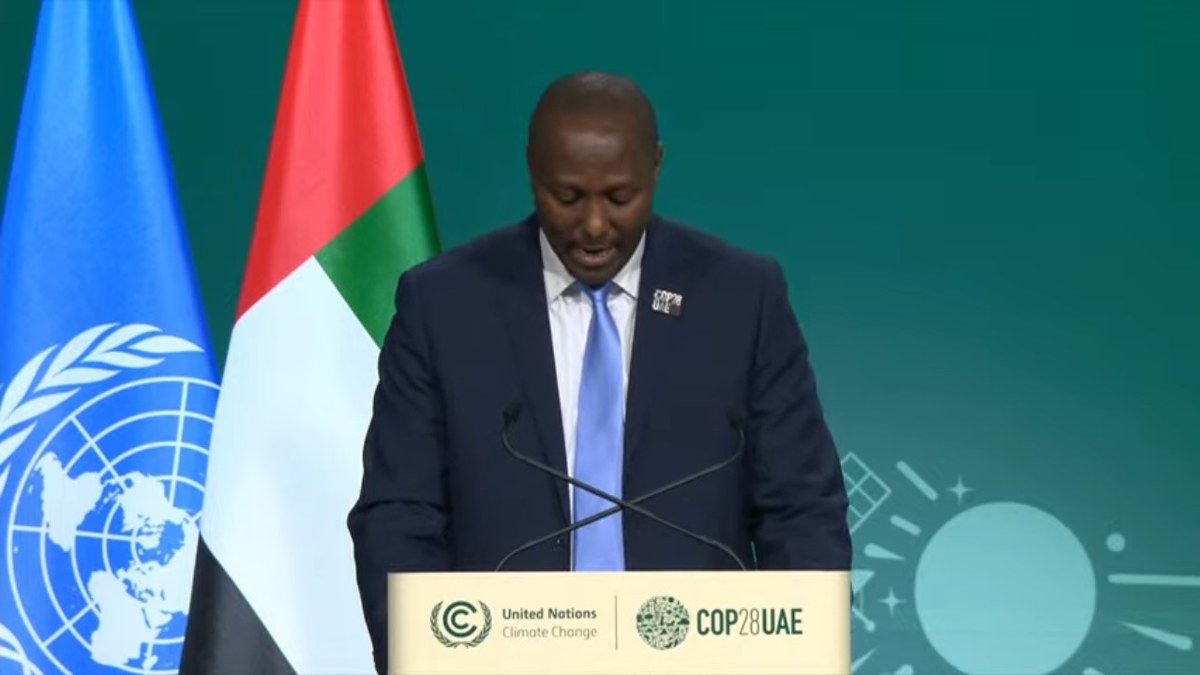
Russell Mmiso Dlamini, Prime Minister of Eswatini.
“The commitments made remain just words. Fossil fuels remain high, much against the initial plans,” according to Russell Mmiso Dlamini, Prime Minister of Eswatini.
“In Eswatini, trucks are queuing in large numbers in borders carrying hundreds of tons of coal in transit to the developed world. While this continues the use of nature-based mitigation is being promoted. With such practices, reaching net-zero by 2050 will be impossible and developing countries should not be made to pay through the use of carbon markets.”
“Let us all meet our commitments of deep emission cuts which are largely overdue.”
“Those who have led the way in development and emission should lead the way for mitigation.”
1117 GMT
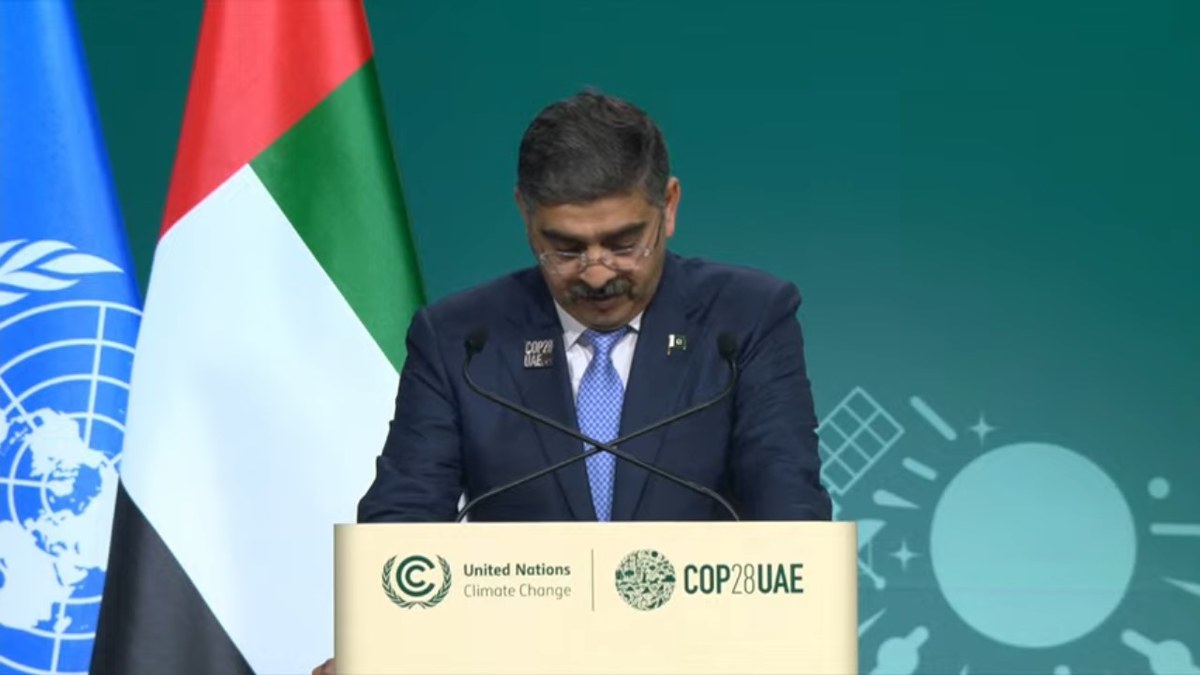
Anwaar Ul Haq Kakar, Prime Minister of Pakistan.
Anwaar Ul Haq Kakar, Prime Minister of Pakistan: “At least half of climate finance must be allocated to adaptation. Our expectations from COP28 are high but not unrealistic. Let this COP deliver with actions not just words.”
Opinion
This section contains relevant reference points, placed in (Opinion field)
1107 GMT
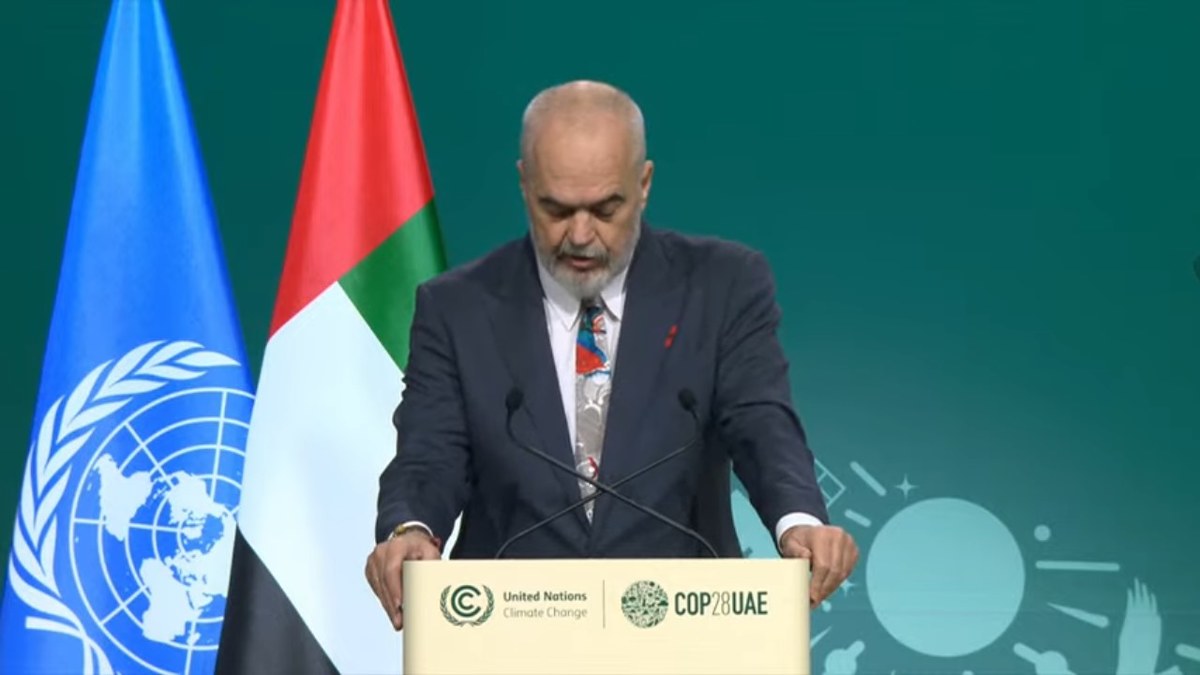
Edi Rama, Prime Minister of Albania
“The Paris Agreement was a beacon of hope, a promise made by the world to safeguard our planet and its inhabitants. However, the reality falls shorter than the commitments made, and the burden of climate action continues to disproportionately fall on the shoulders of developing nations despite our minimal contribution to the crisis while the big polluters do their best to lecture us but not to stop themselves,” Edi Rama, Prime Minister of Albania, told leaders of the high-level session at the UN climate summit in Dubai.
1056 GMT
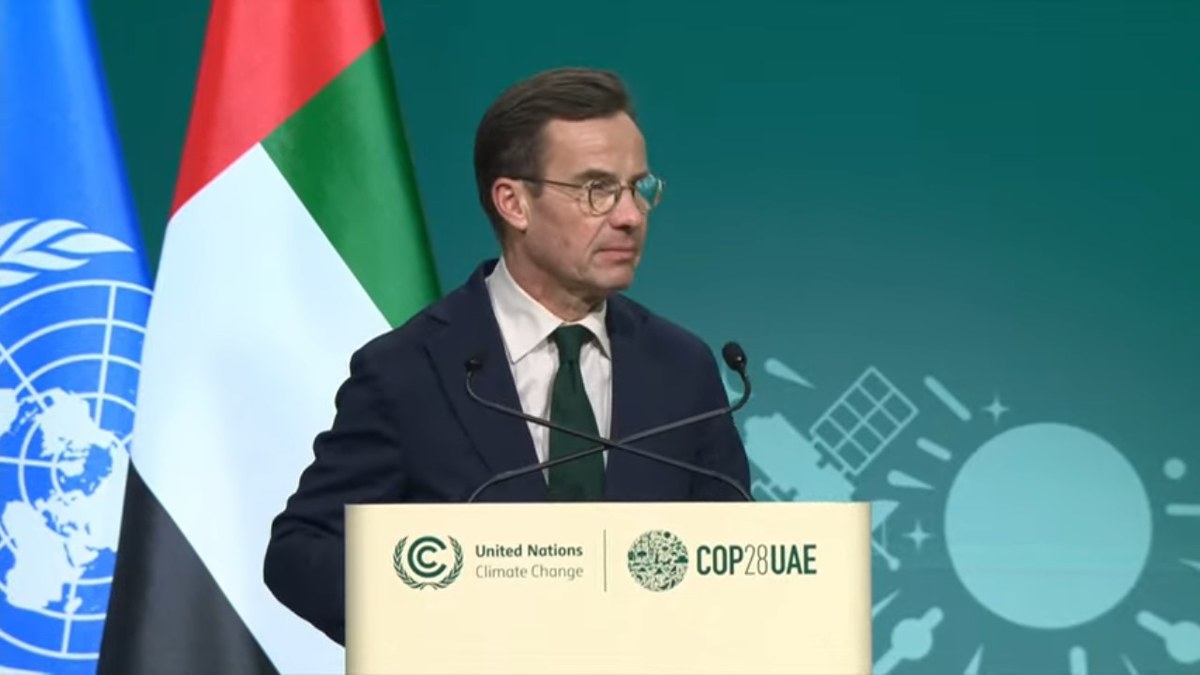
Ulf Kristersson, Prime Minister of Sweden.
“My two keywords here today are urgency and opportunity. Urgency based on science and numerous alarming IPCC reports, and opportunity based on the new jobs and growth that the green transition brings,” according to Ulf Kristersson, Prime Minister of Sweden.
1031 GMT
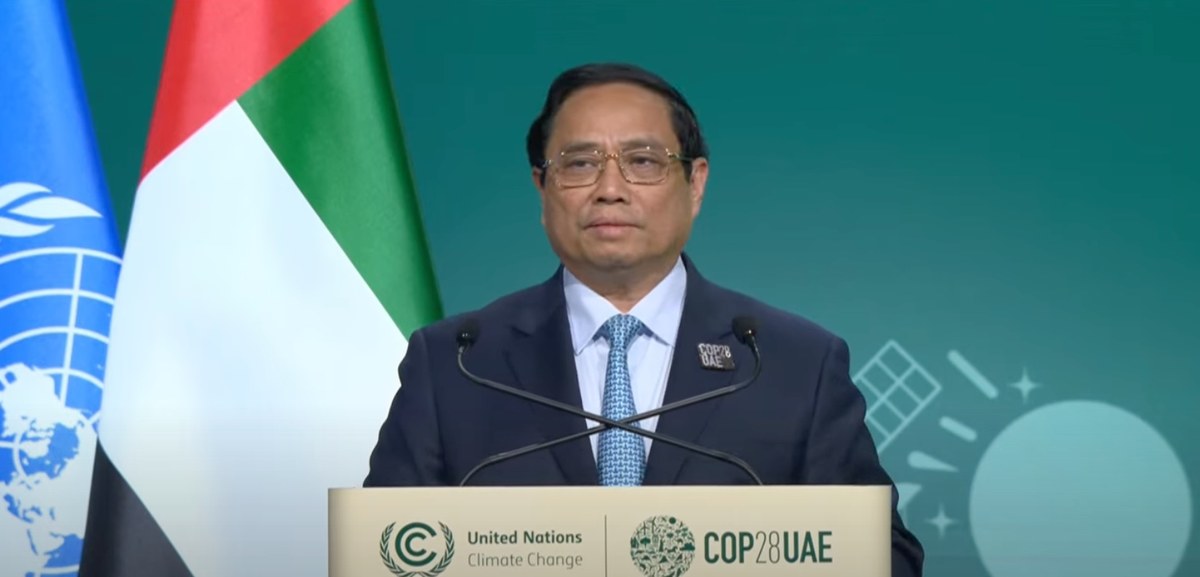
Chinh Pham Minh, Prime Minister of Vietnam
“Developed countries need to provide greater support to developing and least developed countries. This includes preferential capital transfer of advanced technology, high quality human resource development, smart governance, and assistance in improving modern and effective market institutions in line with the unique circumstances of each country,” Chinh Pham Minh, Prime Minister of Vietnam, said in his speech.
“At the same time, developing and least developed countries cannot afford to be passive or overly dependent on external help. Instead, they need to make greater efforts in improving their own capacity pursuing self-reliance and resilience and self-improvement in the spirit of no one can help you better than yourself.”
The poor are the real victims of what is happening: we need think only of the plight of Indigenous peoples, deforestation, the tragedies of hunger, water and food insecurity, and forced migration
Pope Francis, in a letter read by Vatican Secretary of State Cardinal Pietro Parolin at the high-level session of COP28 in Dubai
1022 GMT
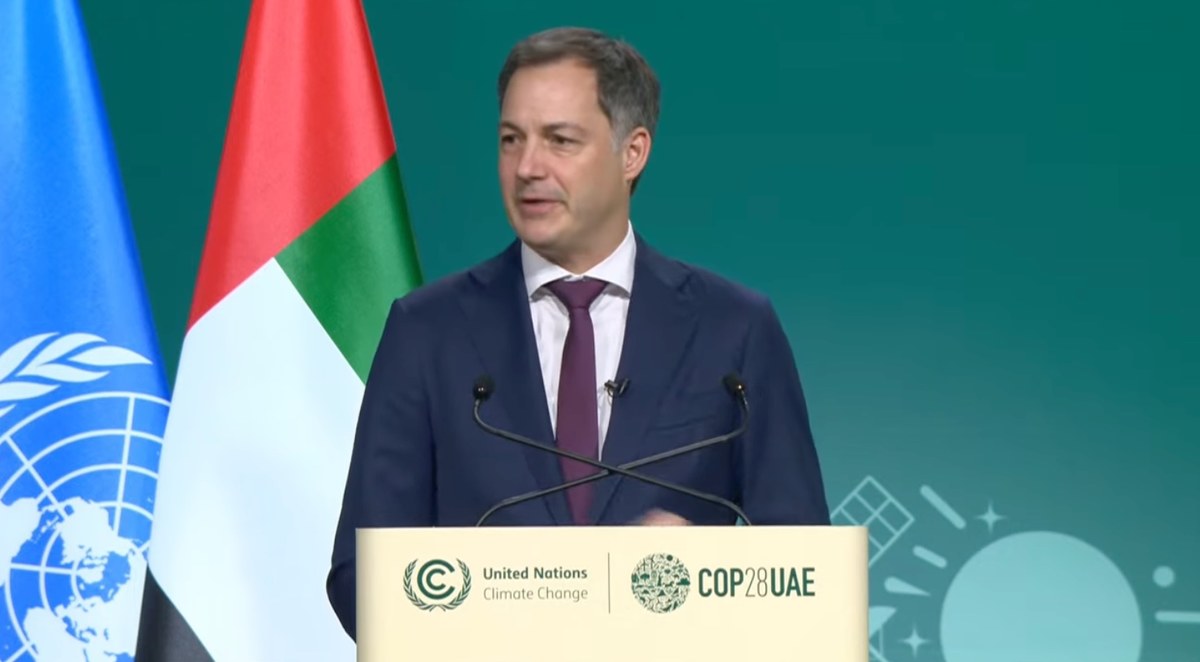
Alexander De Croo, Prime Minister of Belgium.
“The private sector science tells us that, unless there are immediate rapid and large-scale reductions in greenhouse gas emissions, limiting global warming to 1.5°C will be beyond reach,” according to Alexander De Croo, Prime Minister of Belgium.
“Climate issue belongs neither to the deniers nor to the alarmist, it belongs to those who get up early, to those who grab every opportunity to contribute in speeding up the transition.”
1016 GMT
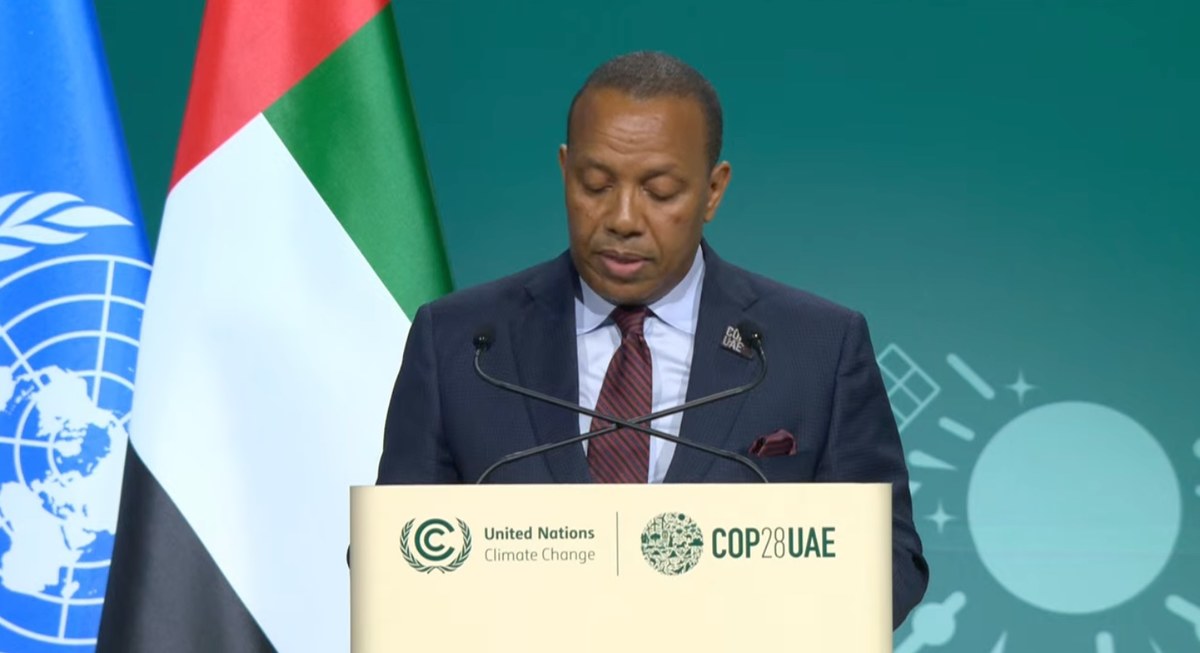
Patrice Emery Trovoada, Prime Minister of Sao Tome and Principe.
Patrice Emery Trovoada, Prime Minister of Sao Tome and Principe: “To hear about these billions of dollars that are promised but are never received, this does not work with countries such as mine.”
“We prefer to rely on the liberating force of creativity and technological information and to rely on AI and to combat and to fight.”
1011 GMT
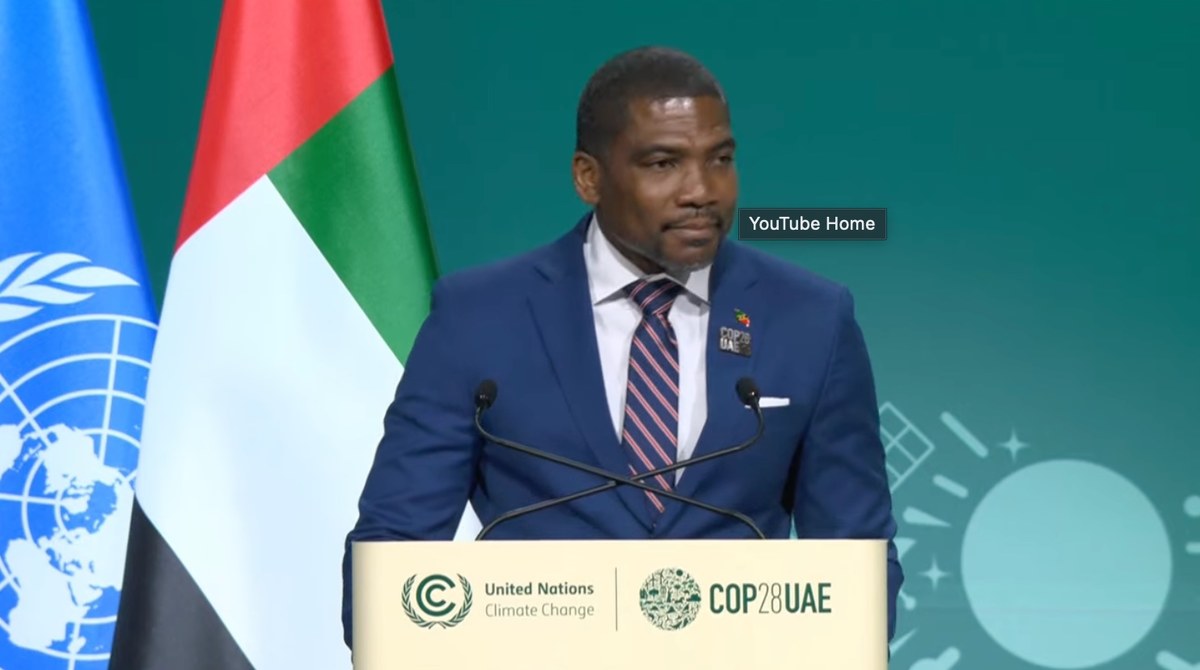
Terrance Drew, Prime Minister of Saint Kitts and Nevis.
“With 50,000 plus people, our small size and notable position as the smallest independent nation in the Western Hemisphere presents opportunity with the convergence of our geostrategic outlook global collaboration and focused investments especially in our energy sector,” Terrance Drew, Prime Minister of Saint Kitts and Nevis told the high-level segment of the UN climate talks.
“We can become the first model sustainable island state to be found anywhere in the world showcasing the path to progress and prosperity.”
1005 GMT
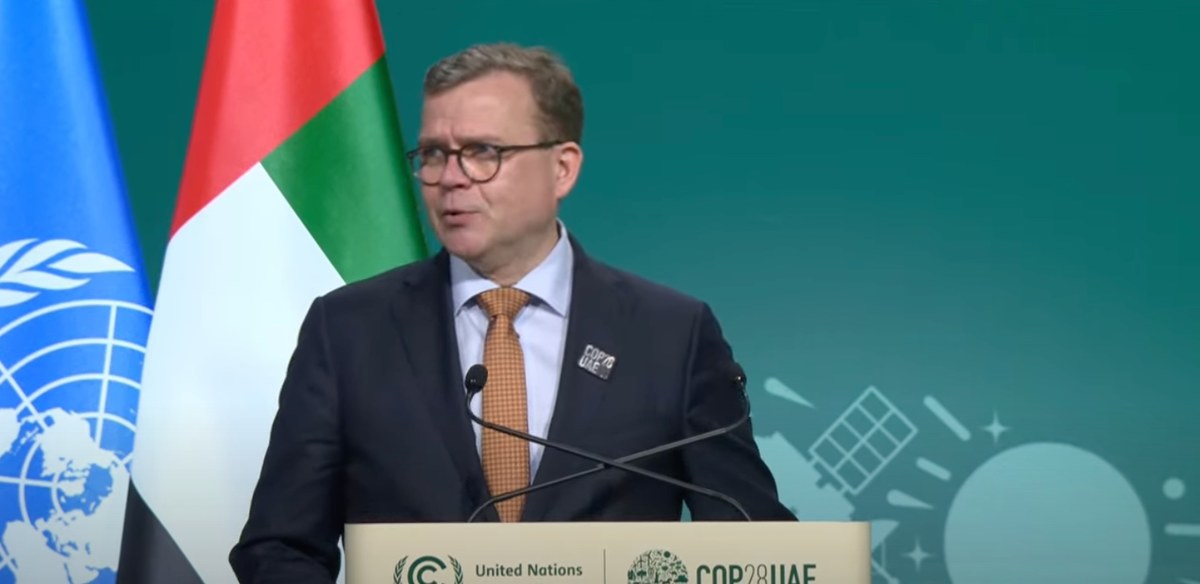
Petteri Orpo, Prime Minister of Finland.
“Finland remains committed to supporting developing countries in their climate action,” said Petteri Orpo, Prime Minister of Finland.
“Finland stands ready to support the new fund with €3 million. We underline the continued importance of other funding mechanisms including those supporting early warning system. We must also ensure that all financial flows are in the line with the Paris Agreement.”
1002 GMT
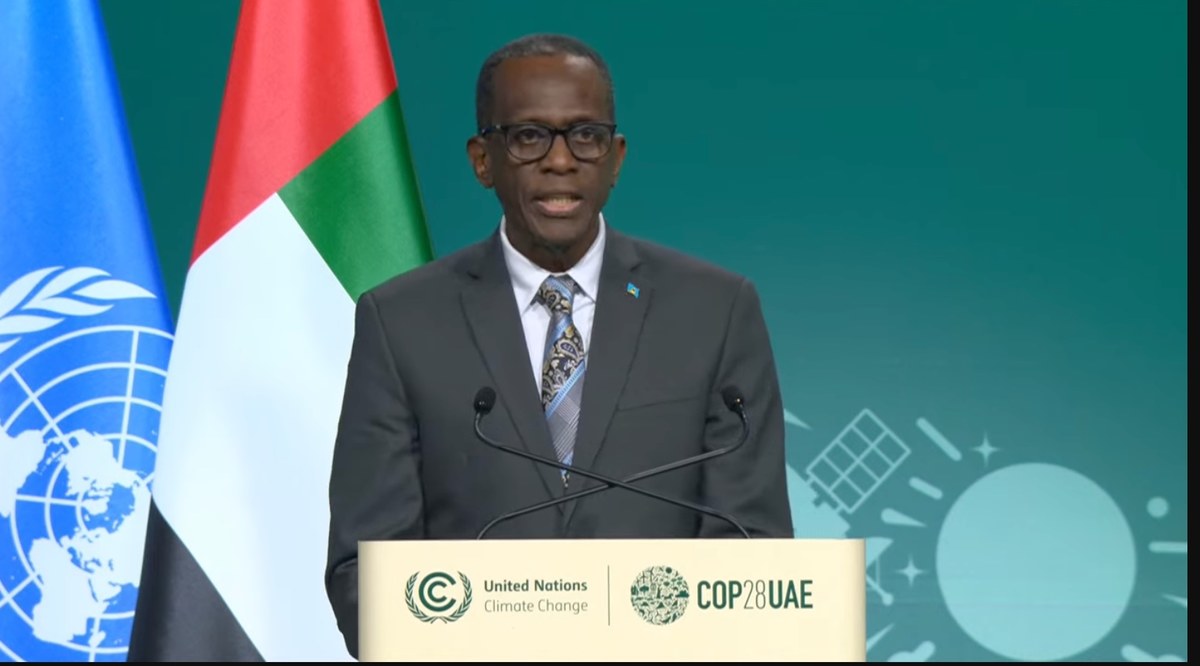
Philip Joseph Pierre, Prime Minister of Saint Lucia.
Philip Joseph Pierre, Prime Minister of Saint Lucia: “The impacts have been devastating to our region. Loss and damage have struck at the core of our economies and our societies.”
“At one extreme, lives and livelihoods have been lost and the extreme our environment is under siege.”
We will be working to accelerate unabated coal phase-out across the world, building stronger economies and more resilient communities. The first step is to stop making the problem worse: stop building new unabated coal power plants
Special Envoy John Kerry, in announcing that the US is joining the Powering Past Coal Alliance
0955 GMT
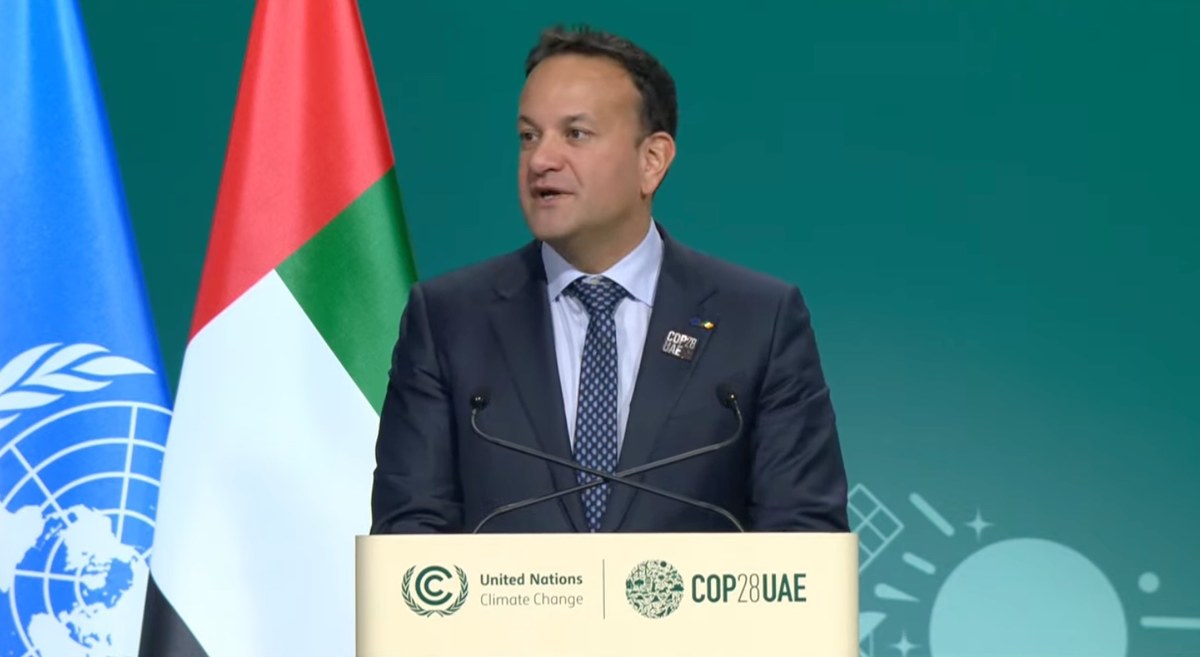
Leo Varadkar, Prime Minister of Ireland.
“With the high cost of living and high energy prices, many worry about how much the transition will cost and what it will mean for their jobs and incomes and living standards. These are legitimate concerns and we need to hear them we need to understand where people are coming from and offer reassurance,” said Leo Varadkar, Prime Minister of Ireland.
“Change is difficult but we must do everything in our power to make sure that the transition is just protecting the vulnerable and leaving nobody behind.”
“Today I am announcing a contribution of €25 million to the new loss and damage fund for 2024 and 2025, and we will make further contributions thereafter.”
0949 GMT
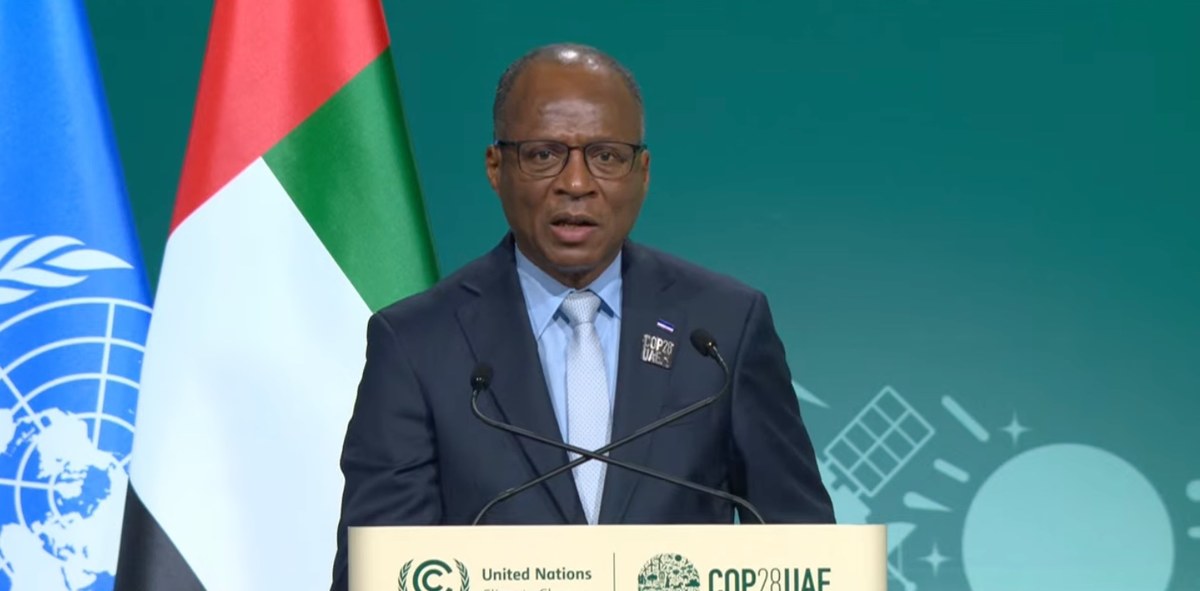
Joss Ulisses De Pina Correia e Silva, Prime Minister of Cabo Verde
“It is a political obligation for all countries, for all leaders to make a top priority out of jointly implementing the solutions and the commitments that we have signed up to. And here, time is the critical factor because nature continues on its course reacting to the conditions that human beings create with their actions and their emissions,” Joss Ulisses De Pina Correia e Silva, Prime Minister of Cabo Verde, said in his national statement.
“We encourage there to be a clear and urgent definition of the financing mechanism for loss and damage. We reaffirm also the urgent need to adopt the multidimensional vulnerability index as part of the climate finance criteria.”
FASTFACT
$3 billion
Amount that the United States has pledged to the Green Climate Fund. The latest pledge would be additional to another $2 billion previously delivered by the US.
0943 GMT
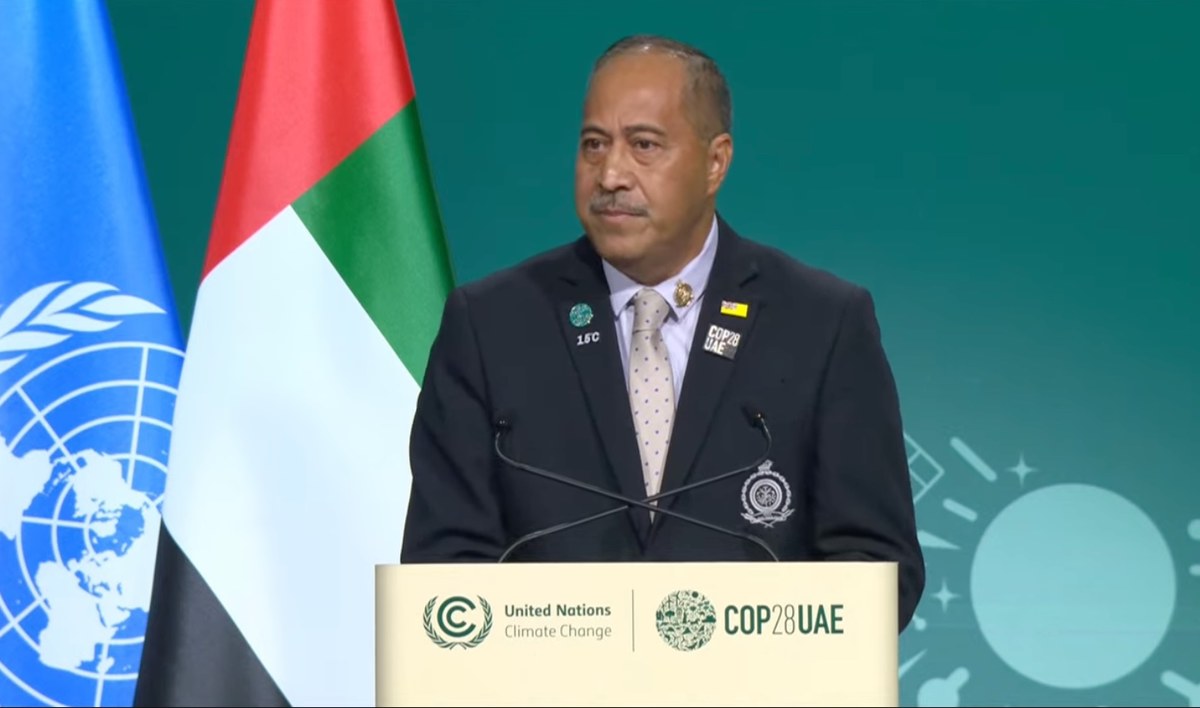
Dalton Emani Makamau Tagelagi, Prime Minister of Niue.
“Time is up and urgent action is now needed to deliver climate finance for lost and damage,” according to Dalton Emani Makamau Tagelagi, Prime Minister of Niue. “Niue is a net sink and has no responsibility for the causes of climate change. Niue is at high risk of tropical cyclones this season and of drought.”
“My people were living in fear of another catastrophic cyclone. Residents and low-lying coastal areas have slowly moved to higher ground to avoid detrimental impacts from damaging heavy swells.”
Just Announced: The UAE has pledged $150 million in new funding for water security solutions in fragile and vulnerable communities. pic.twitter.com/wrhy0VlzP1
— COP28 UAE (@COP28_UAE) December 2, 2023
0936 GMT
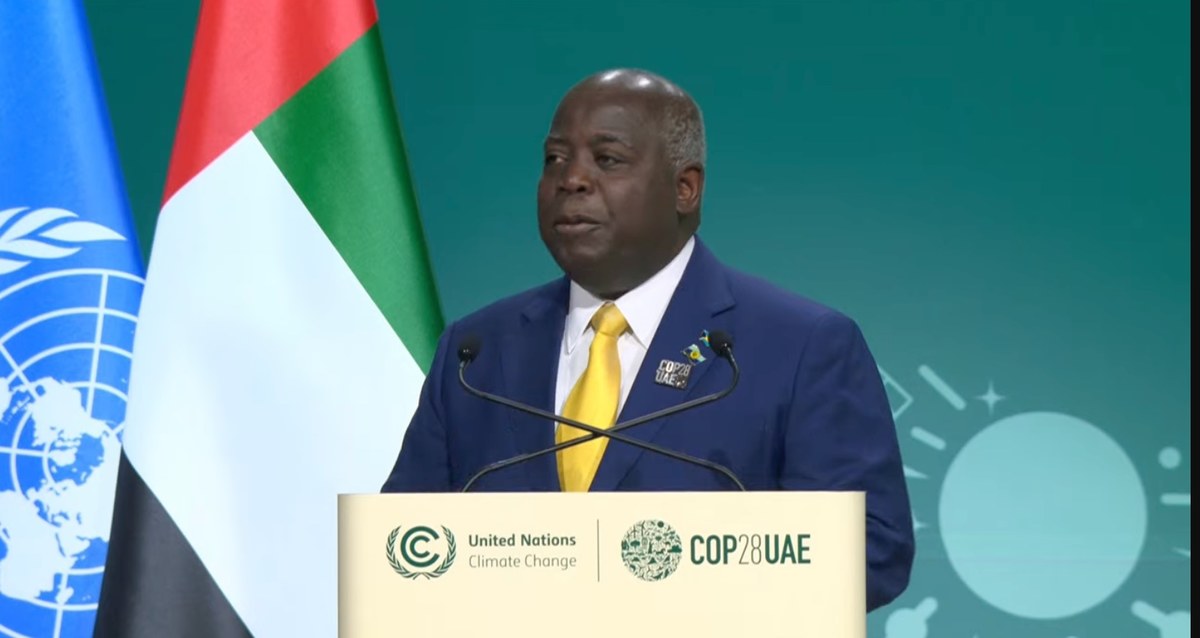
Philip Davis, Prime Minister of Bahamas.
“How long must we now wait to have this new fund capitalized and how long must we wait before we can assess access the funds? Time is the luxury we do not have,” Philip Davis, Prime Minister of Bahamas, said in his speech.
0932 GMT
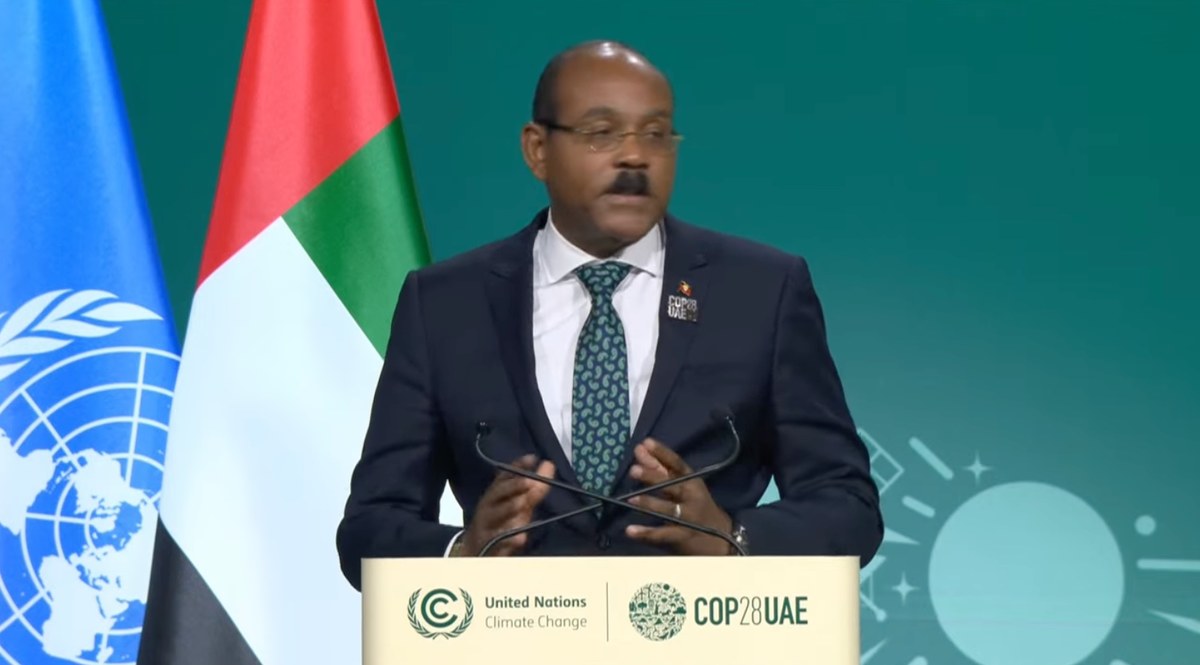
Gaston Browne, Prime Minister of Antigua and Barbuda.
“We are facing an existential paradox, the smallest contributors to global CO2 emissions yet among the hardest hit by climate catastrophe. This is not just an environmental crisis it is a glaring testament to the world where profits are prioritized over people and planets,” said Gaston Browne, Prime Minister of Antigua and Barbuda.
“It is a world where oil and gas conglomerates, shielded by the power of wealthy nations, continue to reap astronomical profits while the survival of nations like ours hangs in the balance.”
0926 GMT
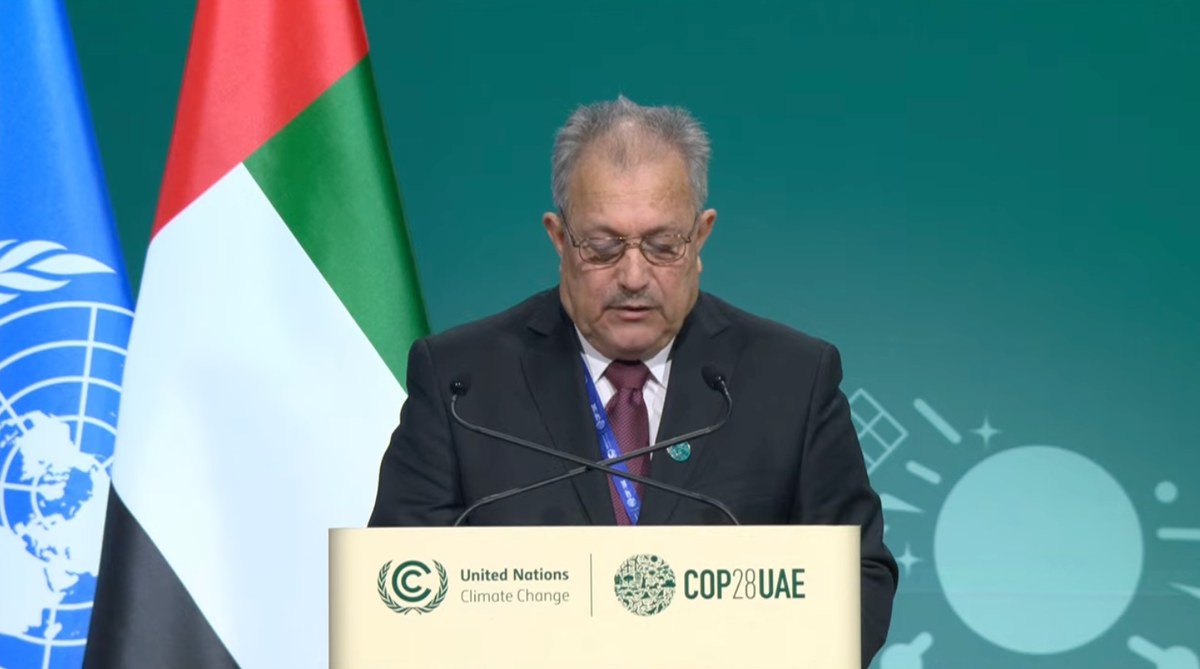
Housain Al-Arnous, Prime Minister of Syria.
Housain Al-Arnous, Prime Minister of Syria: “It is time to work seriously to advance climate action and to accelerate emissions reduction through energy transition and also through using land sustainably and in an integrated manner. It is time to transition to sustainable food systems and to operationalize systems to limit loss and damage.”
Syria suffers from the impact of climate change. This is evident in the declining rainfall and the rise in dust storms and heat waves.”
0914 GMT
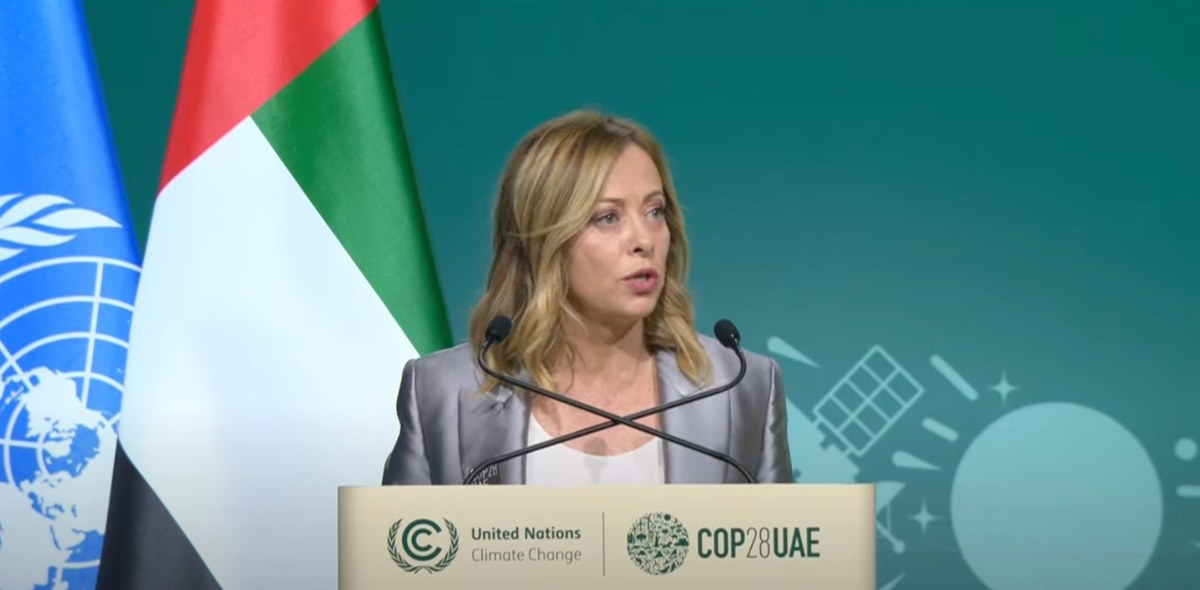
Giorgia Meloni, Prime Minister of Italy.
“Italy is doing its part in the carbonization process and it does it in a pragmatic way that means with the technology neutral approach free from unnecessary radicalism,” according to Giorgia Meloni, the Prime Minister of Italy.
“Italy intends to direct an extremely significant share of the Italian climate fund whose overall endowment is €4 billion to the African continent, not however through a charitable approach, because Africa does not need charity, it needs to be put in the condition to compete on an equal footing in order to grow and prosper thanks to the multitude of resources that the continent possesses.”
---
Pope Francis pleads with COP28 to find breakthrough on climate change
DUBAI: Pope Francis on Saturday called on the UN climate summit to strive for a essential breakthrough agreement to stem global warming that includes the elimination of fossil fuels, saying climate had “run amok.”
The 86-year-old pope had planned to attend the conference but a lung inflammation forced him to remain in the Vatican. His full address was left with delegates and Vatican Secretary of State Cardinal Pietro Parolin shortened it in order to remain within the 3-minute time limit for speeches.
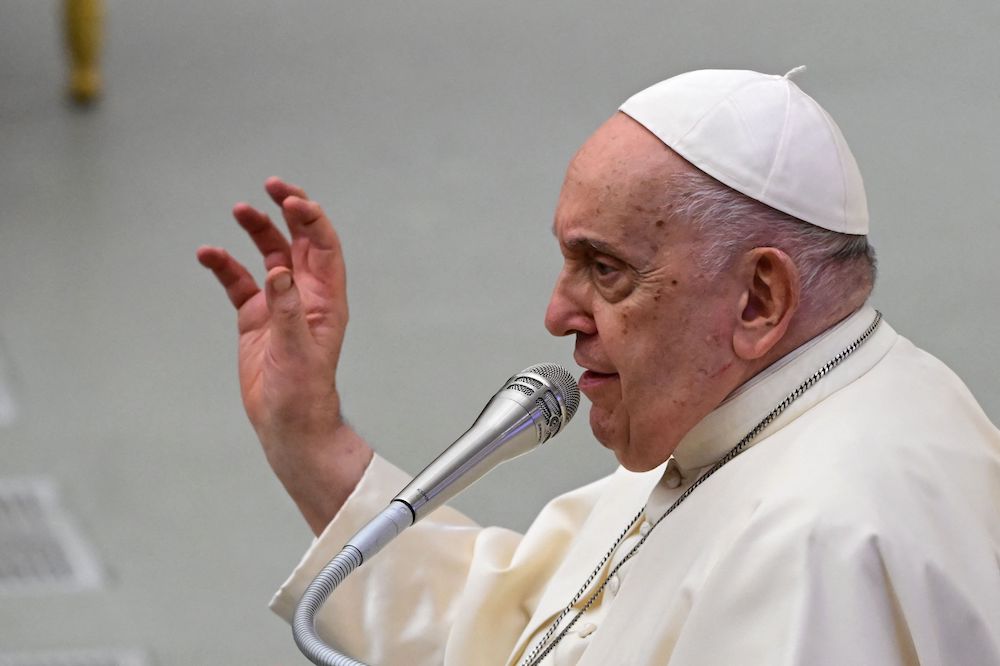
Pope Francis had planned to attend the conference but a lung inflammation forced him to remain in the Vatican. (AFP)
“Sadly, I am unable to be present with you, as I had greatly desired. Even so, I am with you, because time is short,” Francis said in his message.
“I am with you because now more than ever, the future of us all depends on the present that we now choose. I am with you because the destruction of the environment is an offense against God,” he said.
“May this COP prove to be a turning point, demonstrating a clear and tangible political will that can lead to a decisive acceleration of ecological transition,” he said. – Reuters
---
0909 GMT
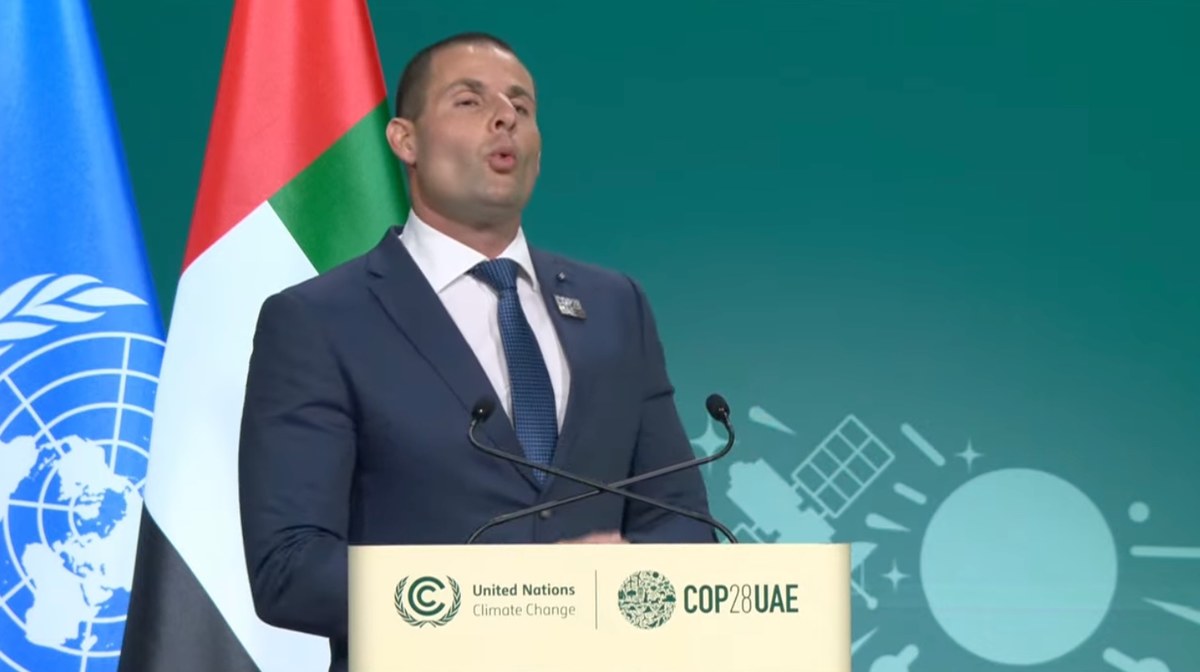
Robert Abela, Prime Minister of Malta.
“We are working hard to achieve a 55 percent emission reduction by 2030 as compared to 1990 levels. Malta has also achieved a lot in these past years but we want to be more ambitious and to do much more: Robert Abela, Prime Minister of Malta, said in his speech.
“Having the lowest gross emission per capital among the EU member states means that our efforts need to be sturdier. In the past ten years we have managed to reduce our greenhouse gas emissions from the energy sector by 60 percent.”
0902 GMT
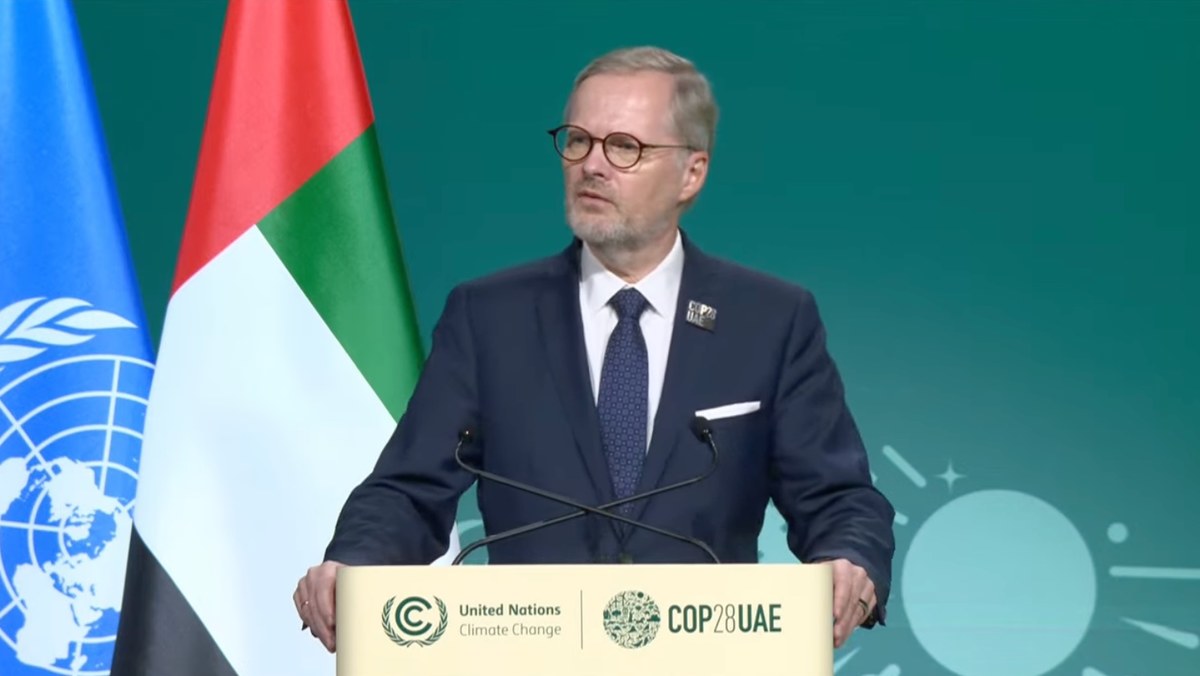
Petr Fiala, Prime Minister of Czechia.
“My country support the Paris agreement of the EU climate and energy including the goal of carbon neutral economy by 2050. We are taking steps to stop coal for electricity and heating by 2033. In part this can be achieved by renovating buildings and developing renewable energy sources,” according to Petr Fiala, Prime Minister of Czechia.
“I want to be clear that the success of our wider climate goals is fundamentally dependent on nuclear energy. This is a good thing as nuclear power is both reliable and clean so we should use its benefits.”
0846 GMT
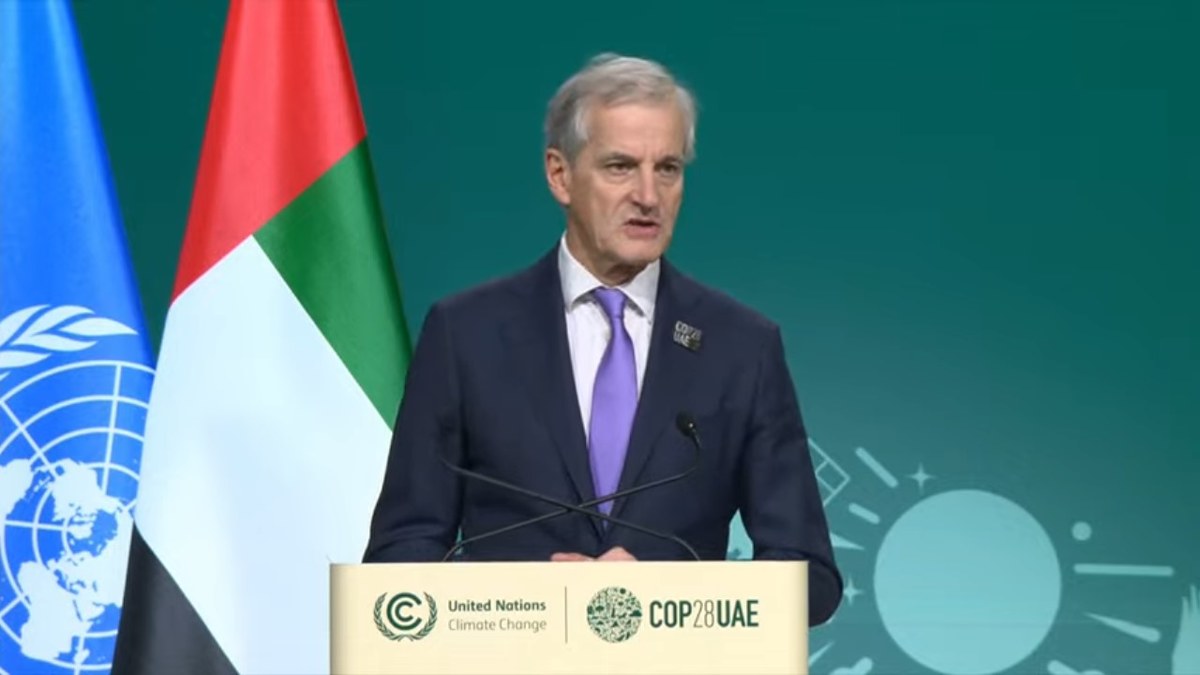
Jonas Gahr Store, Prime Minister of Norway.
Jonas Gahr Store, Prime Minister of Norway: “Norway supports the call for global tripling of renewables and doubling of energy efficiency by 2030.”
0829 GMT
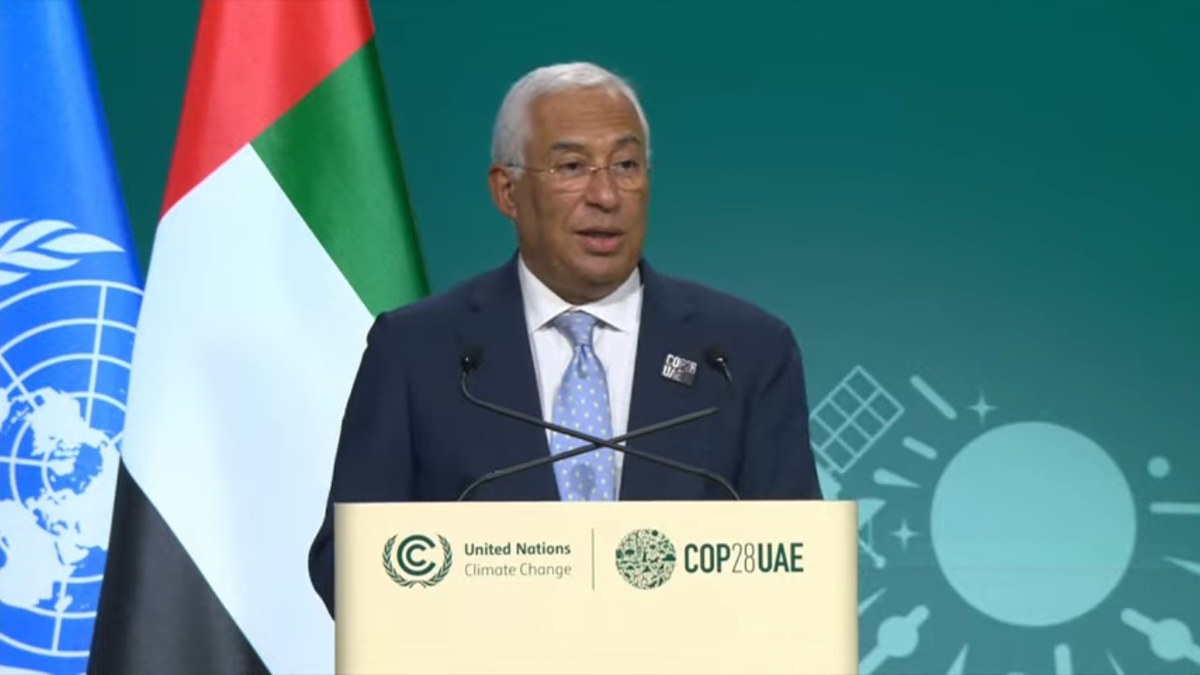
Antonio Costa, the Prime Minister of Portugal.
Antonio Costa, the Prime Minister of Portugal, meanwhile said: “Climate transition in Portugal will present an enormous opportunity. An opportunity for research, development, towards innovation. An opportunity of investment, most of them already engaged, with an amount of €85 billion in the next two decades, representing 35 percent of our GDP.”
#WATCH: How the first day of leaders’ summit at #COP28 unfolded as climate leaders and global partners gathered in #Dubai to vow to step up climate action | More here: https://t.co/xWFQu4b1Fh pic.twitter.com/lMy1hRpOCH
— Arab News | Business (@ArabNewsBiz) December 2, 2023
0823 GMT
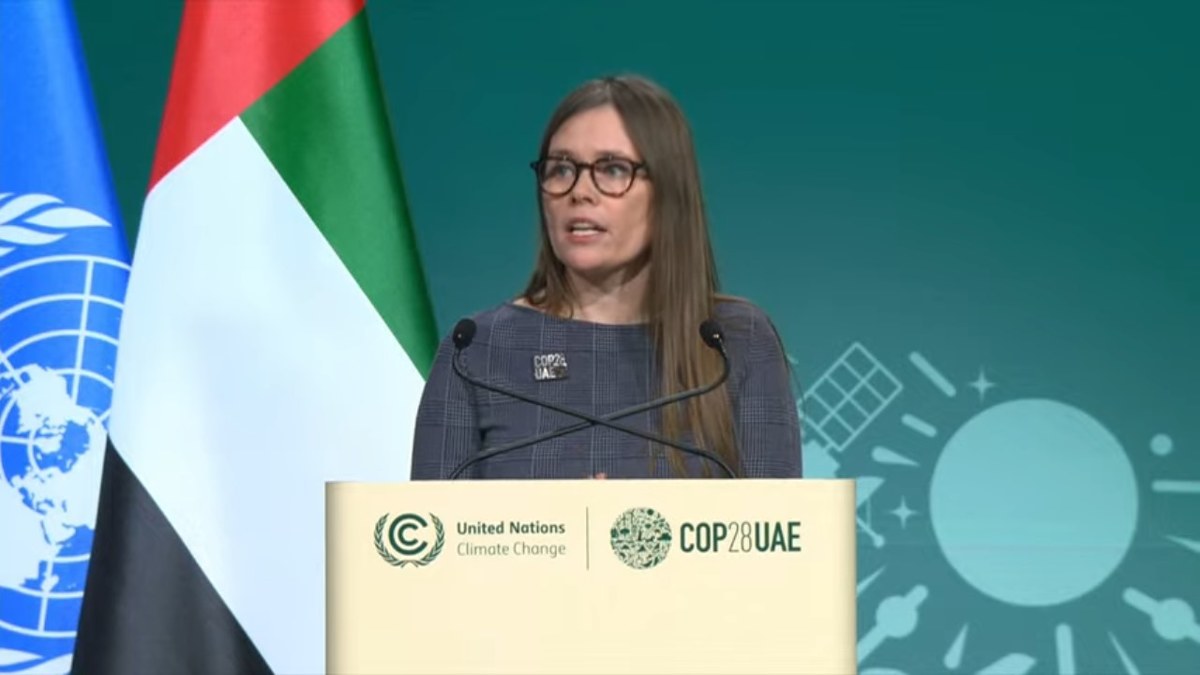
Katrin Jakobsdottir, Prime Minister of Iceland.
“We need to do more to cut emissions, a lot more. We need to accelerate a green energy transition, scale up green solutions, increase nature-based solutions, and make sure those who pollute pay,” Katrin Jakobsdottir, Prime Minister of Iceland, said in her statement.
“But we also need to do less. Our economic systems focus on maximizing production and consumption rather than sustainability and wellbeing. And this needs to change.”
“Iceland supports the phasing out of fossil fuels and subsidiaries of fossil fuels need to end. We should not burn public money to cook the planet, instead we should scale up support for clean solutions.”
0814 GMT

Kyriakos Mitsotakis, the Prime Minister of Greece.
“We have cut our coal use by over 80 percent. We are growing our economy at a much faster pace than the Eurozone average while reducing emissions. In total, our emissions are down by 43 percent from 2005 as we turn to renewable energy, the best performance amongst European countries,” Kyriakos Mitsotakis, the Prime Minister of Greece, said in his statement.
0802 GMT
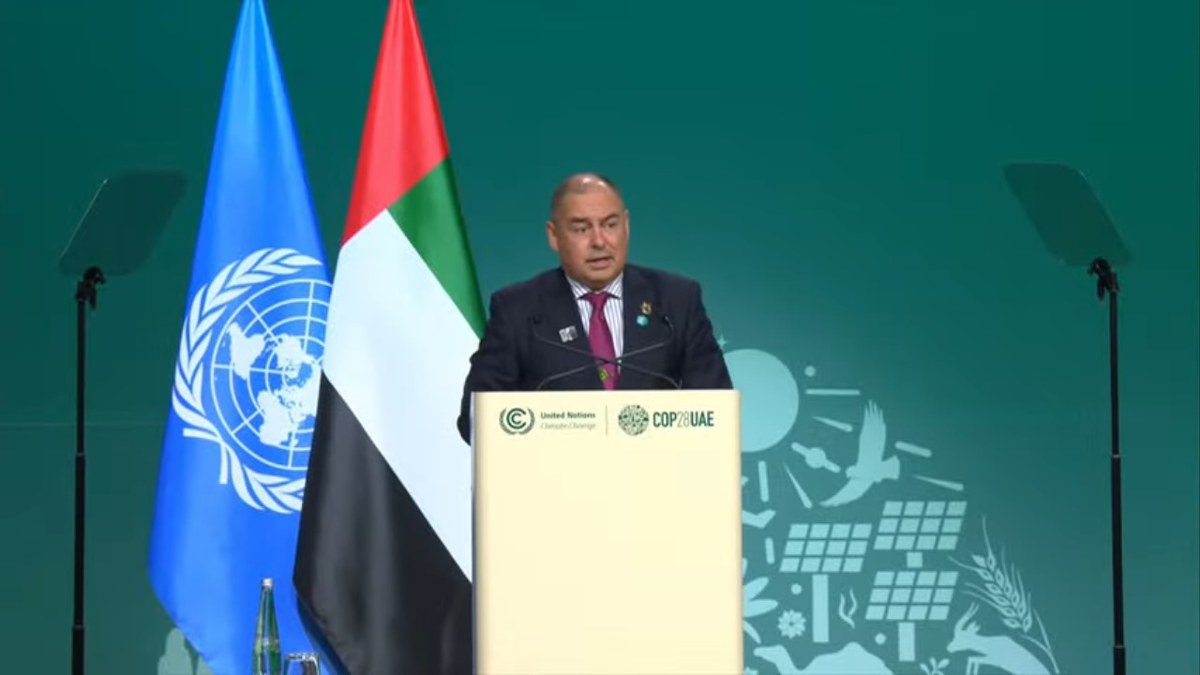
Mark Brown, Prime Minister of Cook Islands.
“To put it plainly, the world must fulfill its financial commitments. It is as simple as that. In 2022, the IMF reported that $7 trillion were spent on fossil fuel subsidiaries, yet the global commitment to $100 billion per year to the Paris Agreement continues to struggle for fulfillment,” according to Mark Brown, Prime Minister of Cook Islands.
0753 GMT
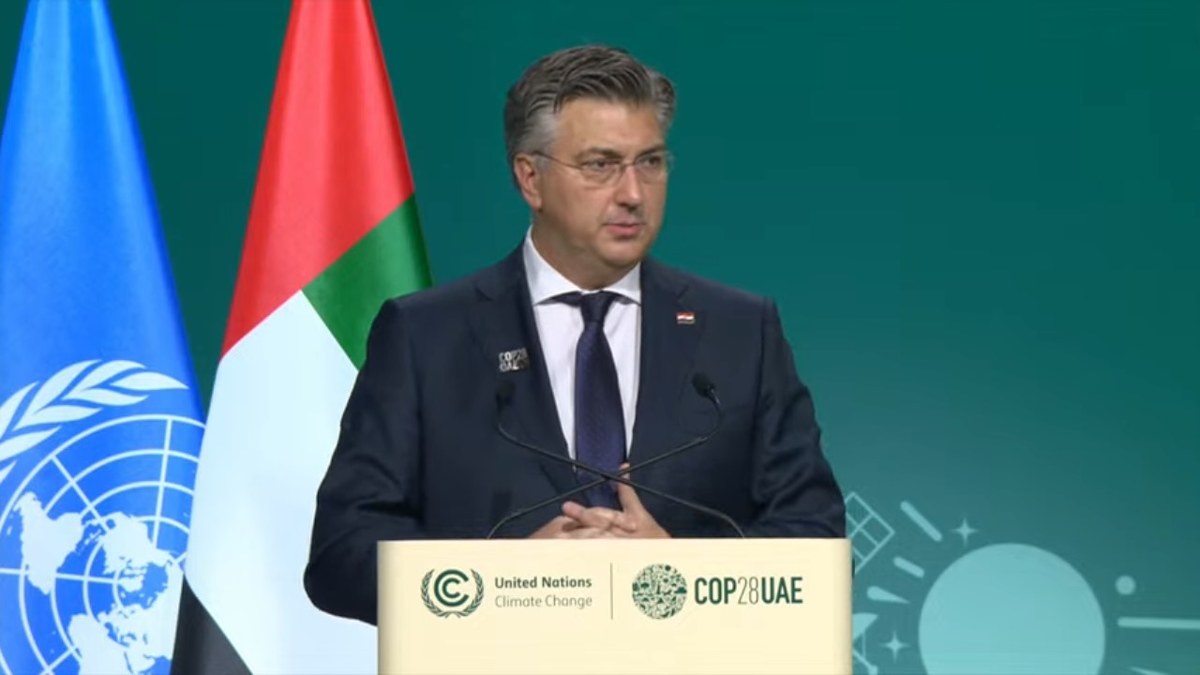
Andrej Plenkovic, the Prime Minister of Croatia.
“We need to do much more to curb climate change. However, we are doing the opposite. Half of the CO2 emissions emitted in the last two centuries have been emitted in the past three decades, and they continue to grow,” according to Andrej Plenkovic, the Prime Minister of Croatia.
0749 GMT
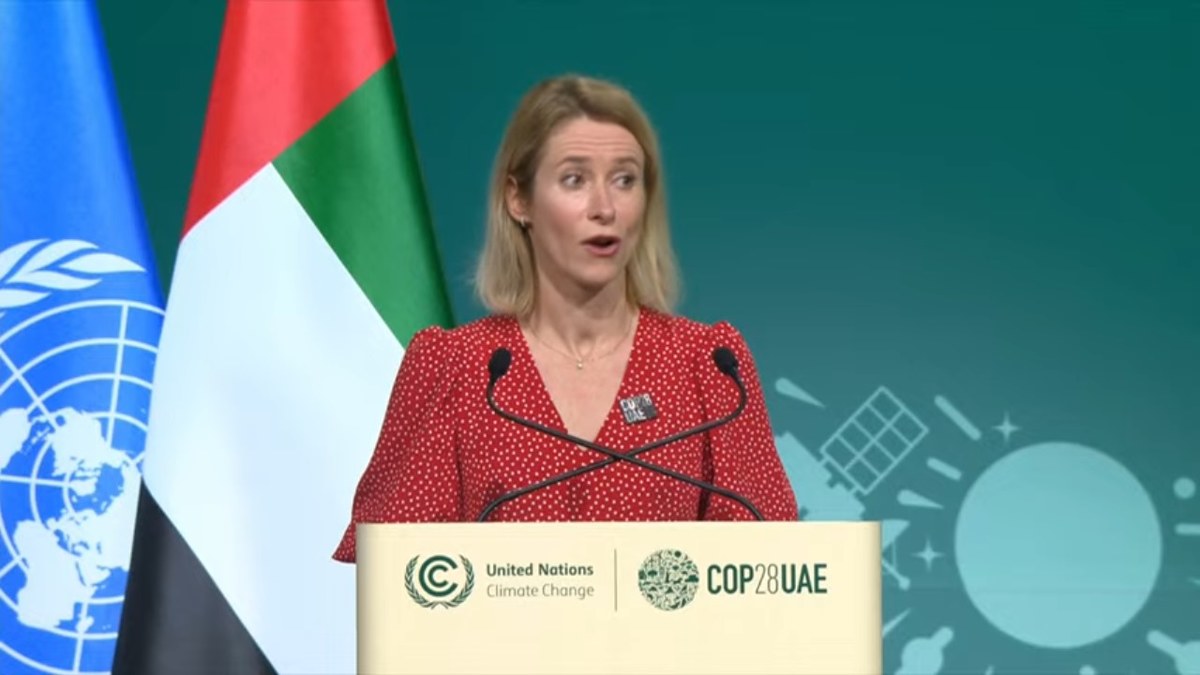
Kaja Kallas, the Prime Minister of Estonia.
“Today, digital is enabling our green reform. Estonia’s parliament has adopted a new renewable electricity target of 100 percent by 2030. More than tripling our level of renewable production,” according to Kaja Kallas, the Prime Minister of Estonia.
0749 GMT
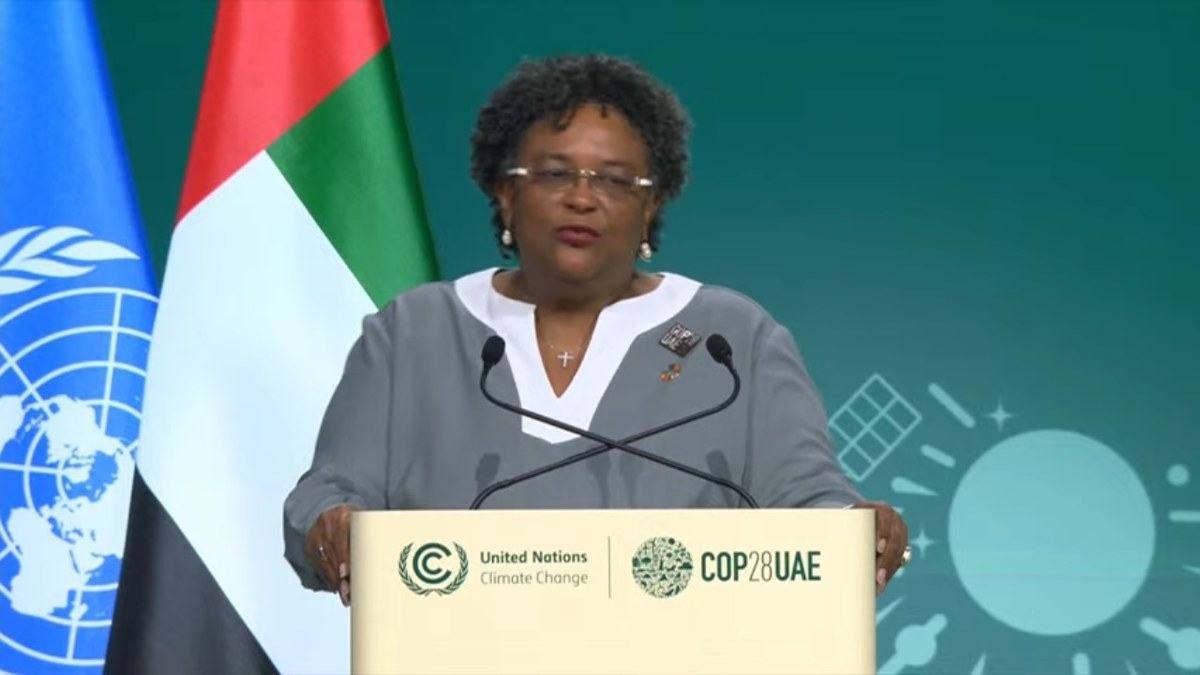
Mia Amor Mottley, Prime Minister of Barbados.
“We’ve seen this year, one third of the days of the year exceed 1.5°C, this is a death sentence. And the reality is, unless we change course, we are going to see far more lives lost and far more damage done,” Mia Amor Mottley, Prime Minister of Barbados, said in her speech.
0744 GMT
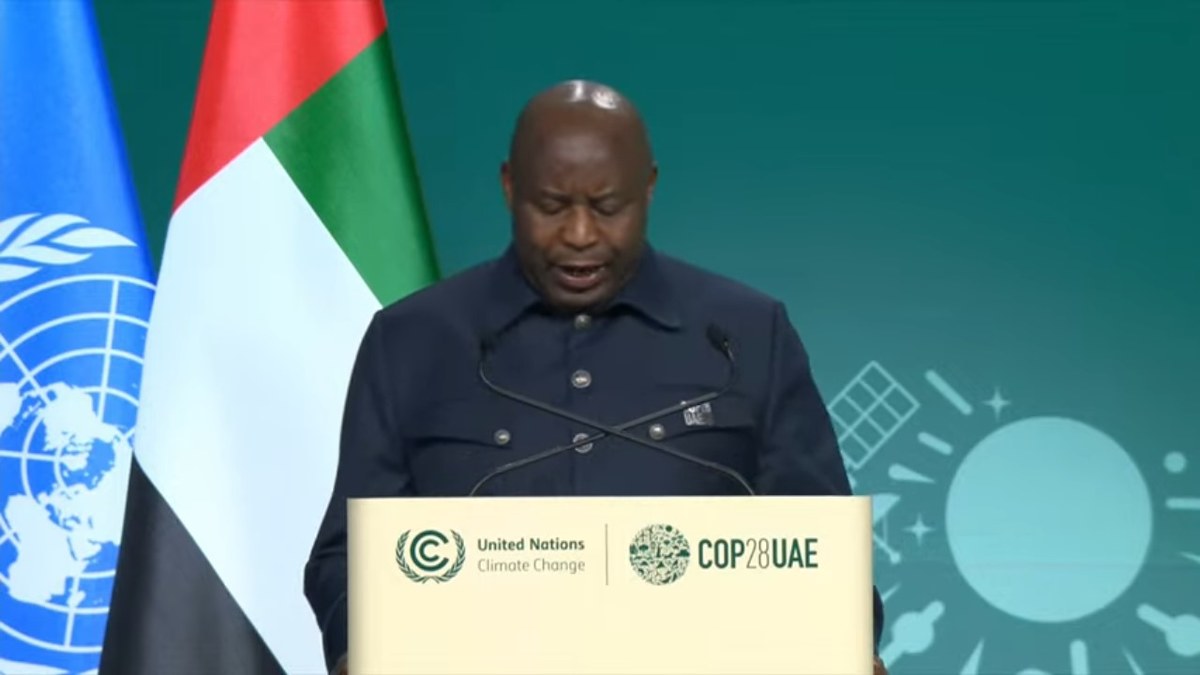
Evariste Ndayishimiye, President of Burundi.
Evariste Ndayishimiye, President of Burundi, in his country statement, said “Burundi has committed via the Nationally Determined Contributions to protect the environment, to strengthen resilience towards climate change, and to boost food security. This is infused in our national policies and our vision for Burundi. An emerging country by 2040, and a developed country by 2060.”
0733 GMT
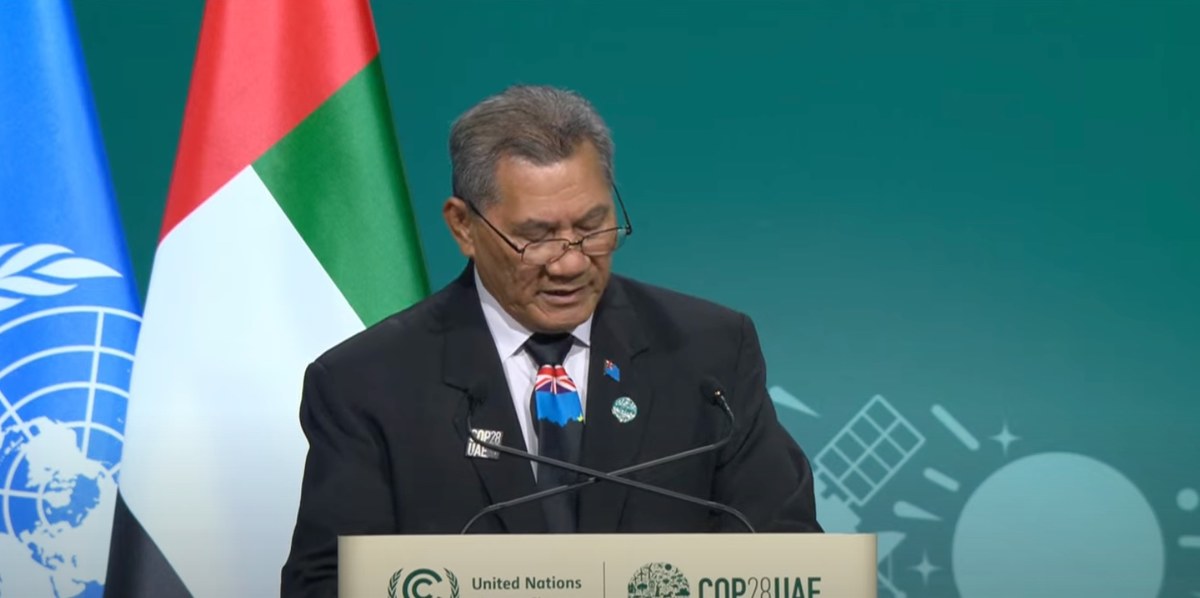
Kausea Natano, Prime Minister of Tuvalu.
“Though I applaud the current status of loss and damage (fund) and the inflow of funding supports, it is our hope that the challenge on the accessibility to the fund is limited or is eliminated,” said Kausea Natano, Prime Minister of Tuvalu, in his statement.
0724 GMT

Joao Manuel Goncalves Lourenco, President of Angola.
“Tackling the issue of climate change is one of the key priorities in all sustainable development programs and strategies in the Republic of Angola. It is a critical concern and one that deserves special attention,” Joao Manuel Goncalves Lourenco, President of Angola, said.
“We are committed to changing our national energy matrix prioritizing clean energy production sources and we’re doing this through the construction of hydroelectric plants and solar panels parks, which means that more than 65 percent of the current 6,400 MW of energy produced in the country now come from ecological sources.”
0717 GMT
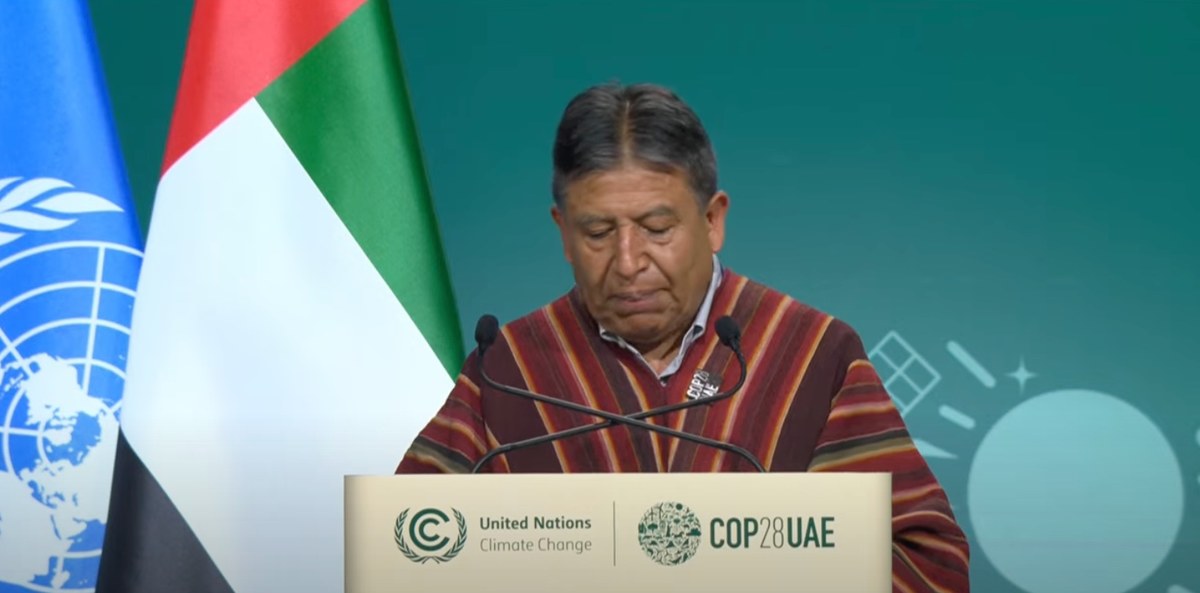
David Choquehuanca Cespedes, Vice President of Bolivia.
“Developing countries have prepared a broad path for developed countries who rely on our resources and yet trample all over us and do not allow us to tread the path with them,” David Choquehuanca Cespedes, Vice President of Bolivia, said in his statement.
“There can be no climate justice climatic without understanding genuine life sciences. There can be no climate justice without recognizing that human intelligence is what is important not artificial intelligence.”
---
Over 110 countries set to join COP28 deal to triple renewable energy
A pledge to triple the world’s installed renewable energy by 2030 is poised to win support from more than 110 countries at the COP28 climate summit on Saturday, with some pushing to make the deal global by the end of the UN conference.
The European Union, United States and COP28 host the UAE have been rallying support for the pledge as a means to the sharp drop in planet-warming emissions needed this decade to avoid unleashing more severe climate change.
Whether governments and companies will rally the huge investments needed to hit the goal is an open question. While deployment of renewables like solar and wind has been surging globally for years, rising costs, labor constraints and supply chain issues have forced project delays and cancellations in recent months.
Getting the deal into the final UN climate summit decision would also require consensus among the nearly 200 countries present. While China and India have signaled support for tripling global renewable energy by 2030, neither has confirmed it will back the overall pledge – which pairs the ramp-up in clean power with a reduction in fossil fuel use. – Reuters
---
0708 GMT
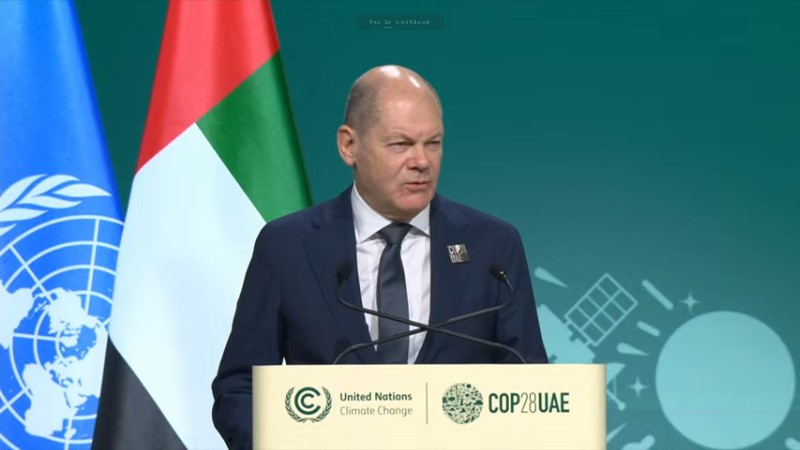
Olaf Scholz, the Chancellor of Germany.
“It is still possible for us to reduce emissions this decade and for us to reach a level that would allow us to achieve the 1.5°C goal, however, science tells us that we need to step up the pace,” according to Olaf Scholz, the Chancellor of Germany.
“I would like to present the following three proposals for you today. First, let us make the expansion of renewables our number one priority in energy policy globally. Let us agree on two binding targets here in Dubai, tripling the expansion of renewables and doubling energy efficiency, both by 2030.”
“As long as we still have to rely on gas, we have to ensure that we produce and transport it in as climate friendly as possible.”
“My second point concerns our international cooperation. We need forms in which to develop common solutions for the challenges of transformation.”
“My third proposal concerns solidarity and responsibility. Already in the year 2022, Germany has surpassed its objective of making available €6 billion ($6.5 billion) per annum for international climate finance.”
“I’m also confident that we will also achieve our goal of making available $100 billion per annum for international climate action together with other industrialized countries.”
0658 GMT
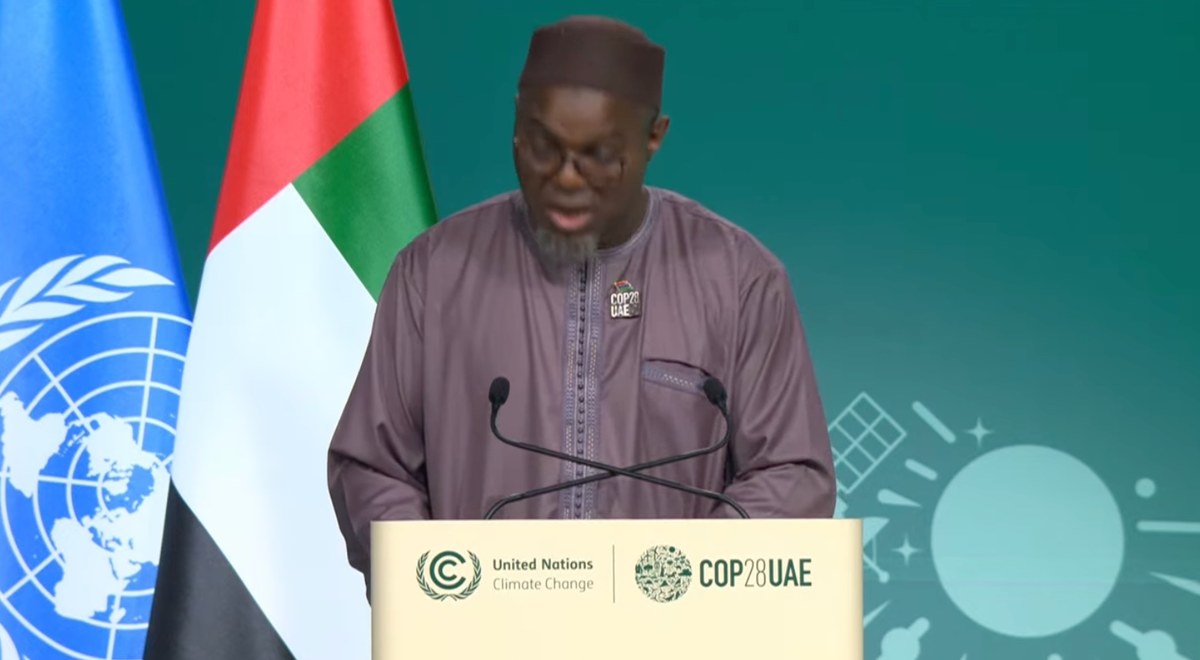
Mohammed B. S Jallow, Vice President of Gambia.
“We recognize that transitioning to a low carbon sustainable economy is not only an environmental imperative but also an economic opportunity; therefore, we are still committed to promoting the use of green and clean energy, sustainable agriculture, and eco-friendly technologies,” Mohammed B. S Jallow, Vice President of Gambia, said in his speech.
“This transition will not only reduce our carbon footprint but also create jobs stimulate innovation and improve the quality of our life of our citizens.”
0651 GMT
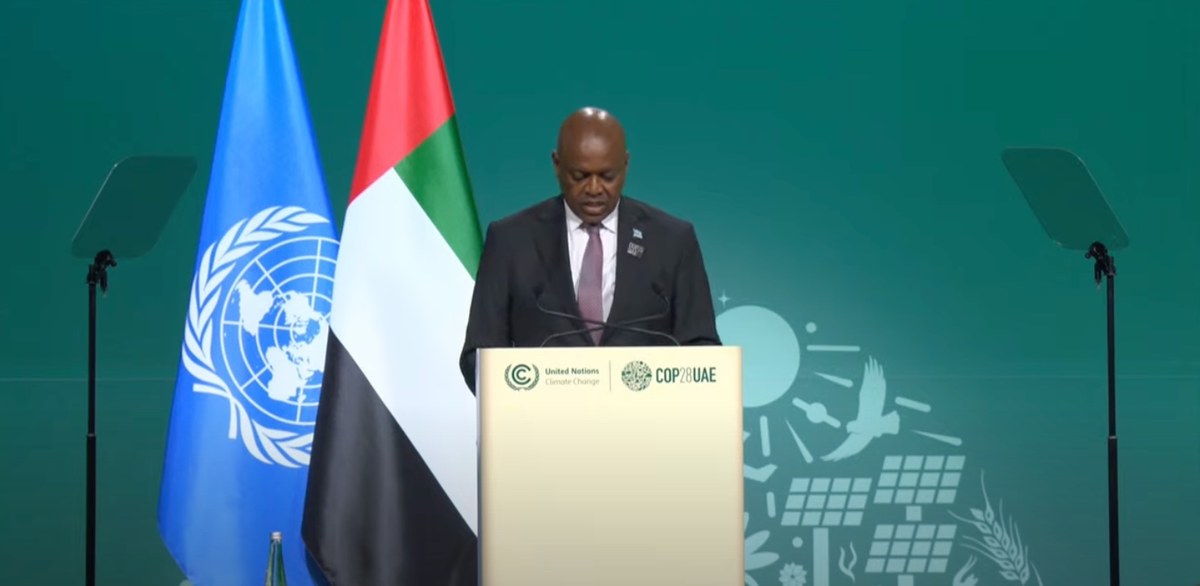
Mokgweetsi Eric Masisi, President of Botswana.
“The government of Botswana has made a decision to increase renewable energy penetration from two percent to 30 percent by 2030,” according to Mokgweetsi Eric Masisi, President of Botswana.
“As a developing country, Botswana prioritizes adaptation as it reduces the vulnerability of communities to climate related hazards and in so doing protecting livelihoods and ecosystems as well as enabling them to be more resilient.”
0643 GMT
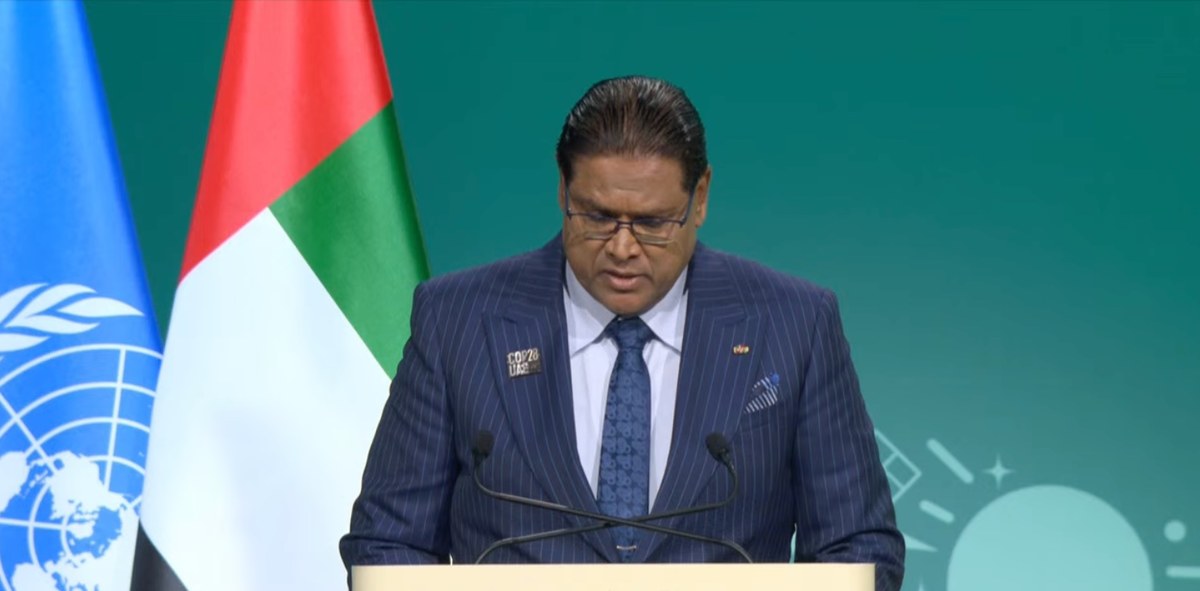
Chandrikapersad Santokhi, President of Suriname.
“As part of the eight Amazonian countries united in the Amazon corporation treaty organization, we are also committed to fight deforestation of the Amazon region. My country and people are forced to adapt to extreme dry and wet weather events which cause losses and damages,” Chandrikapersad Santokhi, President of Suriname, said in his national statement.
“At the same time, we must respond to the legitimate demands of our population for economic development and diversification as we do through a balanced approach consisting of developing the natural resources through environment-friendly strategy by sustainable forest management and active protection of biodiversity and also by continued transition to green energy and other green innovations and technologies.”
0633 GMT
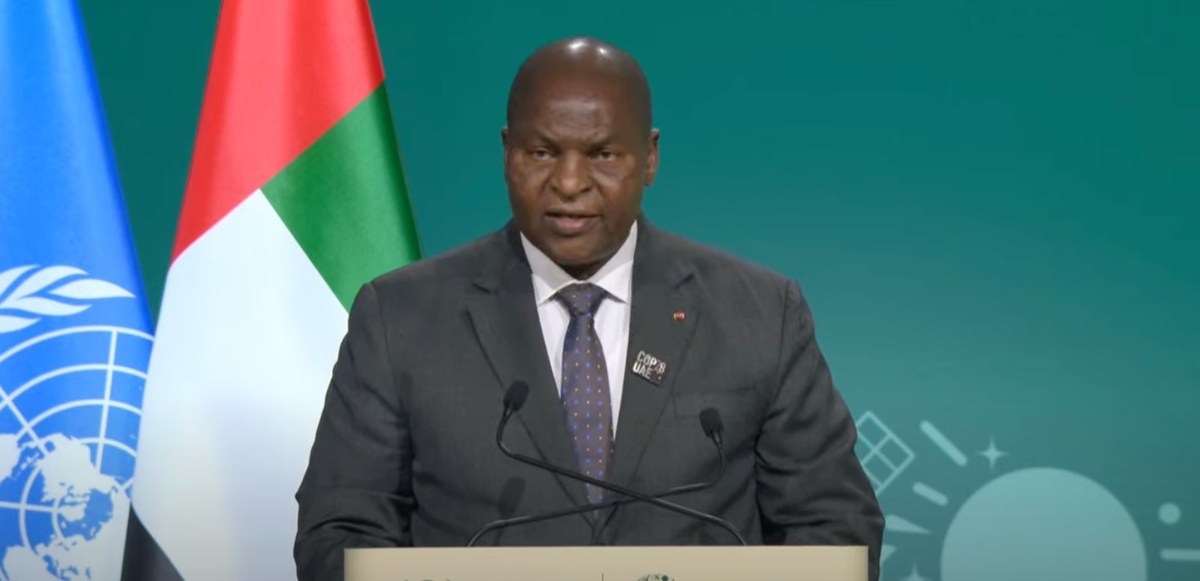
Faustin-Archange Touadera, President of the Central African Republic.
“Africa which bears least responsibility in terms of emissions, responsible for just four percent of global emissions, but unfortunately, Africa is a primary victim of the direct impacts of climate change,” according to Faustin-Archange Touadera, President of the Central African Republic.
“Central African Republic has been classed among the five countries which are most threatened by the effects of climate change.”
“When it comes to determining who should pay for the climate bill, the answer is, bearing in mind the gap between developed countries which are the primary polluters and poor countries, it would be logical for the former to finance the mitigation process.”
0617 GMT
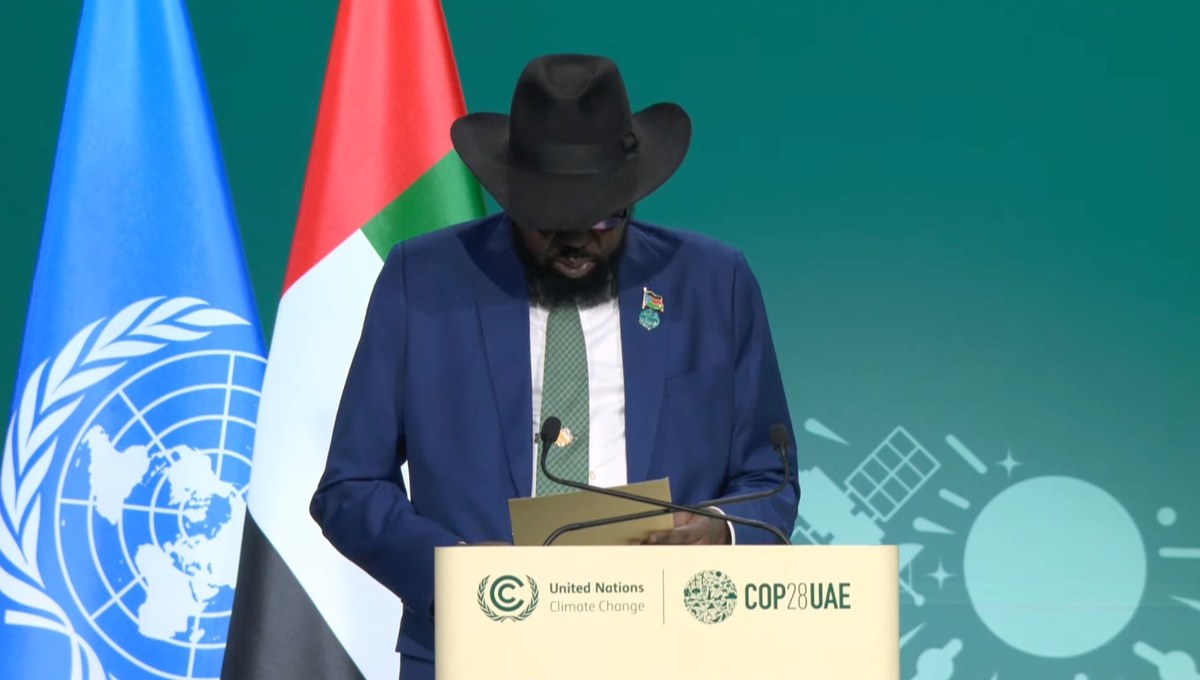
Salva Kiir Mayardit, President of South Sudan.
“For four years now, the country is suffering from floods, droughts, excessive heat high temperatures, and irregular rain patterns. These climate change related factors have negatively affected the livelihood of our people the people are internally displaced,” Salva Kiir Mayardit, President of South Sudan said in his national statement speech.
“That is causing subnational conflicts between the displaced and host communities. So, peace and security are clearly affected as a result of climate change.”
“We have come to this COP28 with the hope that we, the world leaders, will commit ourselves to the implementation of the provisions of the Paris Agreement.”
“Climate change financing to the less developed countries is very important so that these countries can implement their climate adaptation and mitigation projects,” he added.
0605 GMT
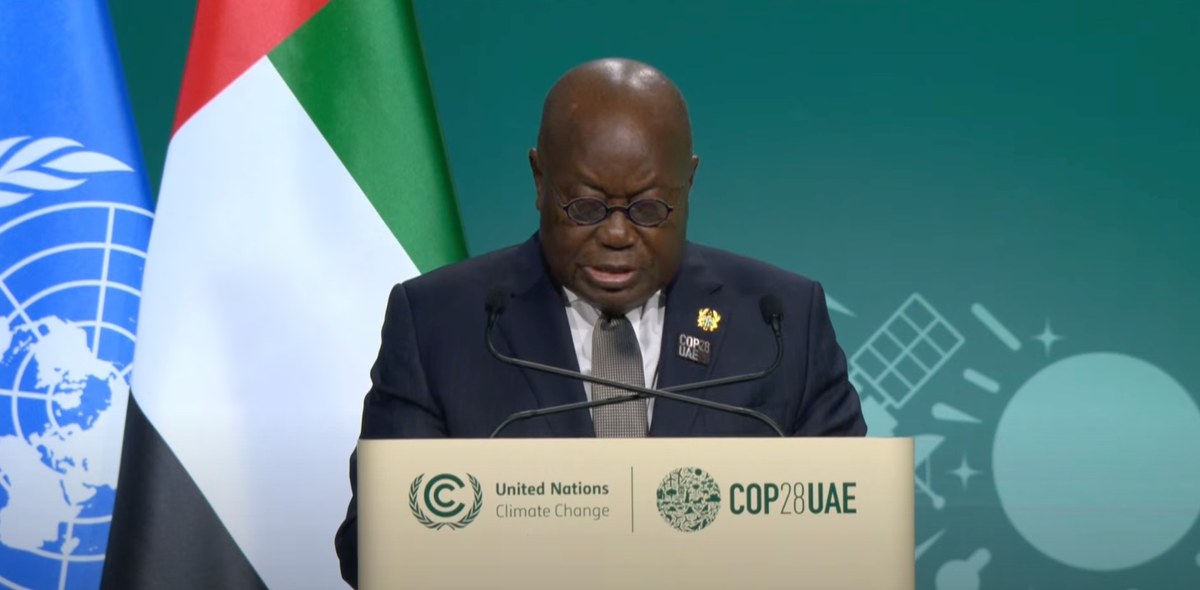
Nana Addo Dankwa Akufo-Addo, President of Ghana.
“We are all now aware that climate change has an enormous impact on the fundamentals required for our survival on earth. It imposes developmental constraints and burdens on are already stretched resources and we, in Ghana are witnessing this phenomenon for ourselves at first hand,” said Nana Addo Dankwa Akufo-Addo, President of Ghana.
“A few weeks ago parts of my country Ghana were confronted with the severe humanitarian crisis triggered by the spillage of water from our country’s largest hydroelectric dam due to unusually high rainfall patterns.”
“We encourage our international partners to support the V20 loss and damage fund, the global shield against climate risk, and ultimately the UNFCCC loss and damage fund to ensure the availability of robust social safety nets for the developing world during such climate crisis.”
0551 GMT
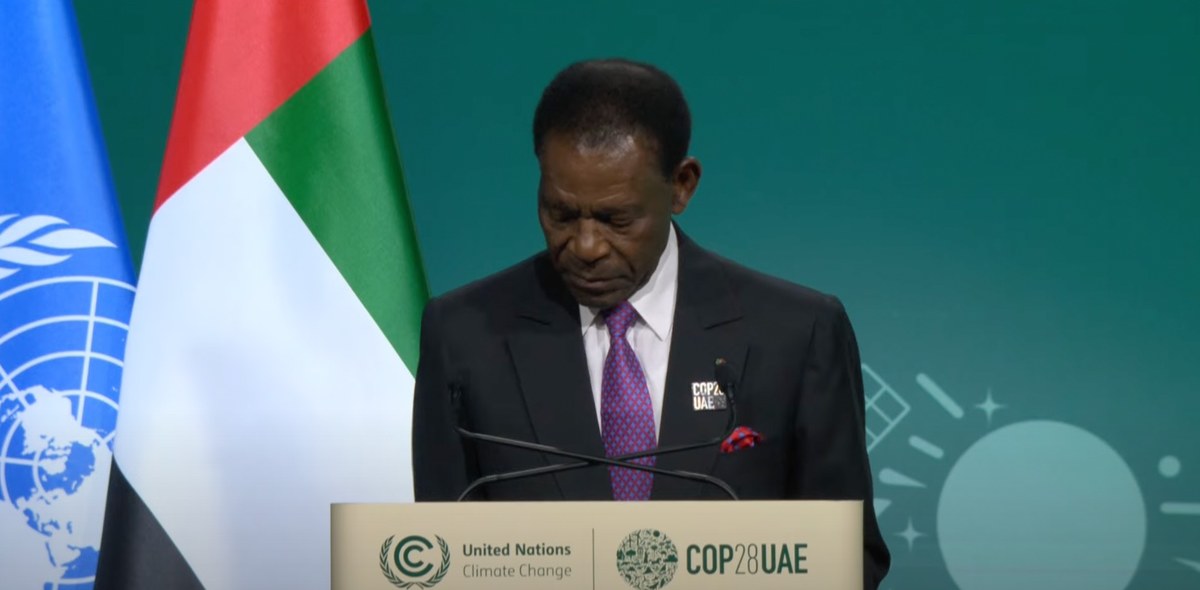
Obiang Nguema Mbasogo, President of Equatorial Guinea.
“Africa is one of the regions with the highest rates of carbon capture and oxygen release in the world; yet, paradoxically we are the region which draws the least benefits,” according to Obiang Nguema Mbasogo, President of Equatorial Guinea.
“In light of that it’s not enough, in our view, for developed countries to simply wring their hands and make empty promises. Rather, they need to fulfill their commitments and obligations under the Paris agreement that we achieved at COP21 and ensure the rollout and implementation of tangible concrete action to mitigate the adverse impact of climate change.”
“We issue an urgent call for renewed commitment at COP28 to provide Africa with adequate transparent and just financing going forward as well as ensuring the requisite transfer of technology.”
Mbasogo faulted developed nations for failing to deliver on their pledges to meet their commitments on financing for climate action and meet their own targets to curb their industries’ emissions.
“Africa is one of the regions in the world that sequesters the most carbon and emits oxygen,” he said.
0544 GMT
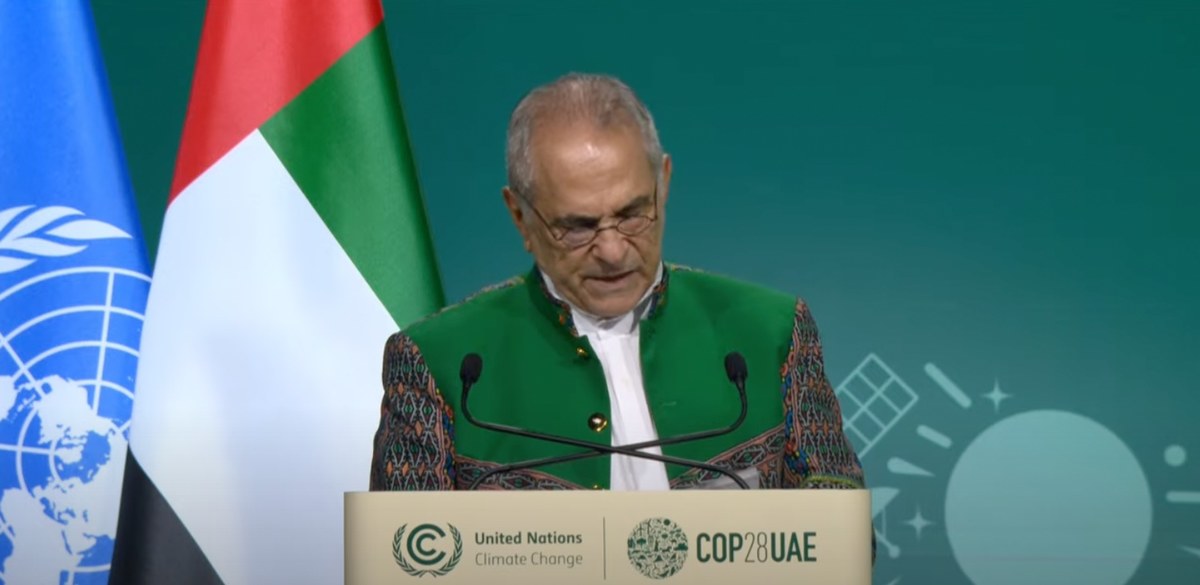
Jose Ramos Horta, President of Timor-Leste.
“I urge the WHO to declare a public health emergency of international concern, the highest level of emergency that can be declared by WHO,” Jose Ramos Horta, President of Timor-Leste, said in his speech.
---
#WATCH: The primary goals of #COP28 are to accelerate investments in energy efficiency, facilitate the transition to clean energy, and reduce reliance on fossil fuels, Prime Minister of #Croatia @AndrejPlenkovic tells Arab News on the sidelines of COP28https://t.co/xWFQu4b1Fh pic.twitter.com/NszTSCndRR
— Arab News | Business (@ArabNewsBiz) December 2, 2023
The Israel-Hamas conflict also loomed large in the proceedings with several leaders voicing sympathy for the Palestinians in Gaza as the week-long ceasefire ended, and vigorous efforts to extend the truce collapsed.
Israel bombarded eastern areas of Khan Younis in southern Gaza right after the truce ended.
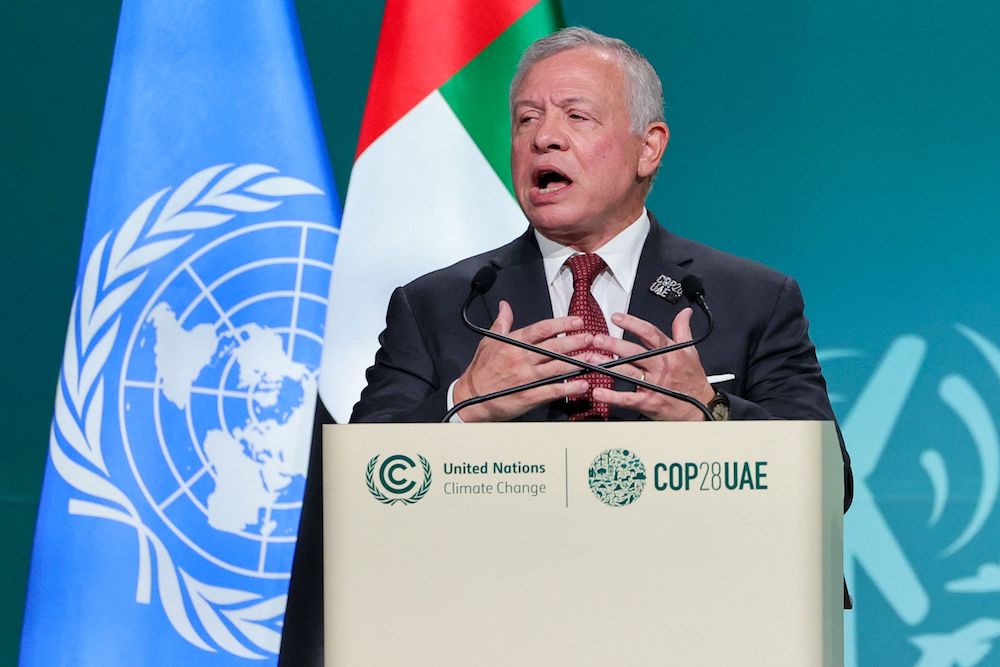
Jordan’s King Abdullah II speaks during the High-Level Segment for Heads of State and Government session at the United Nations climate summit in Dubai on Dec. 1, 2023. (AFP)
“This year’s conference of the parties must recognize even more than ever that we cannot talk about climate change in isolation from the humanitarian tragedies unfolding around us,” King Abdullah II of Jordan said in his speech.
“As we speak, the Palestinian people are facing an immediate threat to their lives and wellbeing. In Gaza over 1.7 million Palestinians have been displaced from their homes. Tens of thousands have been injured or killed in a region already on the front line of the climate change.”
Today, the UAE announced the landmark US$30 billion ALTÉRRA climate focused investment vehicle, the largest ever, with the aim of mobilizing US$250 billion of institutional and private capital into climate action by 2030.
US$5 billion of ALTÉRRA will form the Transformation… pic.twitter.com/NN48MrSSq8
— COP28 UAE (@COP28_UAE) December 1, 2023
The high-level session was also a day of financial commitments, with host country UAE announcing the establishment of ALTÉRRA, the largest private climate vehicle, and a $30 billion commitment to the vehicle with the aim of mobilizing $250 billion of private-sector investment by 2030.
– with agencies






